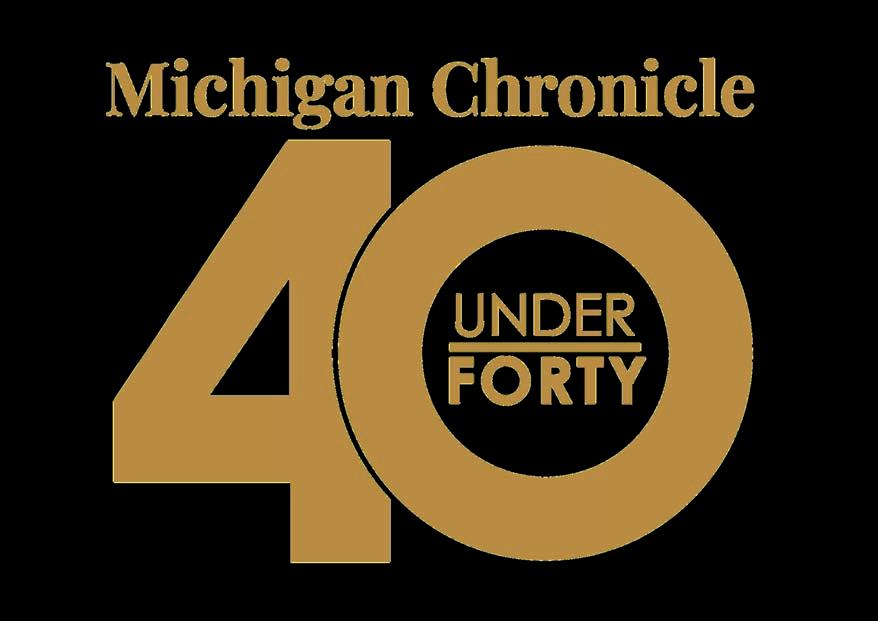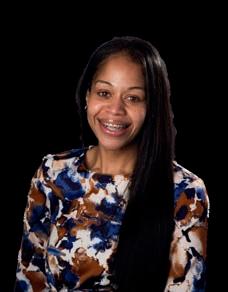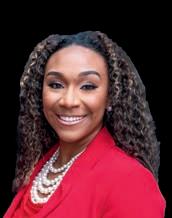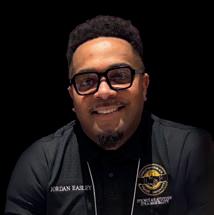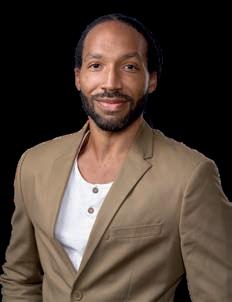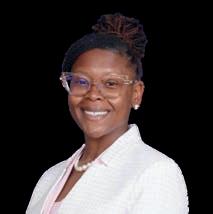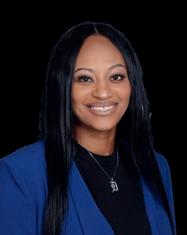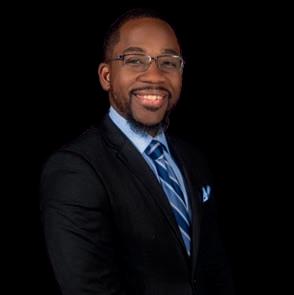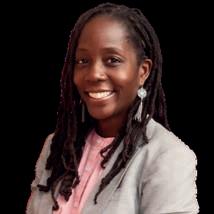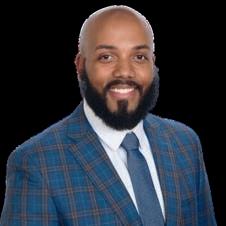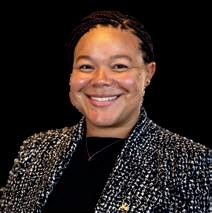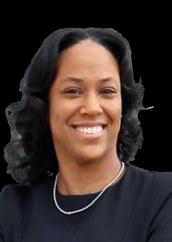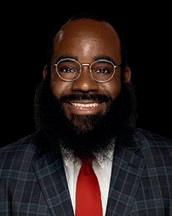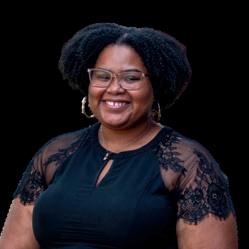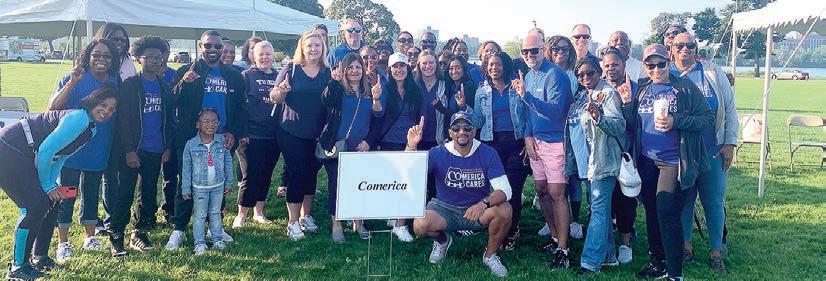





By Ebony JJ Curry SENIOR REPORTER
By Ebony JJ Curry SENIOR REPORTER
Michigan voters can now cast an absentee ballot for the November general election, a move that continues to expand access while raising the stakes for how residents prepare ahead of Election Day. Voters can submit their ballots to their city or township clerk’s office either in person or through the mail. The deadline for ballots sent by mail is 8 p.m. on Tuesday, November 4, with the exception of military and overseas voters, who must have their ballots postmarked by that same date.
By Ebony JJ Curry SENIOR REPORTER
Late Thursday night, Sept. 14, a historic moment unfolded in American labor relations as the United Auto Workers (UAW) union initiated a strike against Ford, General Motors (GM), and Stellantis. For the first time, the union took simultaneous action against all three major Detroit-based automakers. The action involves approximately 13,000 UAW members in assembly plants across Michigan, Ohio, and Missouri, who walked off their jobs after existing labor contracts expired at 11:59 p.m.
IThe rules are straightforward, but deadlines matter. Registered voters who want to cast their ballot absentee have until Monday, November 3, at 4 p.m. to apply. Those who are not yet registered still have time, with same-day registration available through 8 p.m. on Election Day. Applications for absentee ballots can be completed online through the Michigan Secretary of State’s website, making the process more accessible than in years past. Once completed, ballots can be returned by mail, dropped off in person at a clerk’s office, or submitted at an official ballot drop box.
n a breathtaking celebration of talent, determination, and the unyielding spirit of Black excellence, the Michigan Chronicle marked its 10th Annual 40 Under 40 event Thursday evening. This year’s soirée, drenched in the theme “All Black Everything with Gold Accents,” transcended expectations and essential ly illuminated the golden gems within the true essence of Black excellence. Hosted by the charismatic duo of Andre Ash and Lynzee Mychael from Michigan Chroni cle’s Finally Friday, the night was a triumph for the city of Detroit and its vibrant community of young Black professionals.
Shortly before midnight on Sept. 14, GM released a statement expressing disappointment with the strike action, despite offering what it termed an “unprecedented economic package” that included historic wage increases. Stellantis also expressed disappointment in a statement, saying the company immediately went into contingency mode to protect its operations.
Voting rights advocates are emphasizing the importance of timing. Michigan Voting, a coalition of nonpartisan pro-voting organizations and elected officials, recommends that mail-in ballots be submitted by October 22. The caution reflects concerns over postal delays that have complicated election cycles in recent years. Delivering ballots earlier not only ensures arrival before the deadline but also gives voters peace of mind that their participation is secure. Voters can also check the status of their absentee ballot online through the state’s voter information portal.
The evening sparkled with a golden promise as we celebrated remarkable individuals from various walks of life. Among the honorees were the brilliant and vi sionary co-founders of Detroit Hives, Nicole Lindsey and Timothy Paul Jackson. Their work has not only changed the landscape of beekeeping and urban farming in De troit but also exemplified the transformative impact Black professionals can have on their communities.
By Ebony JJ Curry SENIOR REPORTER
“Together we have created a social, environmental, and financial impact through bees,” said Jackson. Lind sey followed that sentiment with, “It is through our local partnerships and collaborative efforts that we exist in over 28 plus locations managing the health of 4.5 mil lion honeybees – humbly speaking our movement has inspired others locally, nationally, and even internationally to take on similar missions.”
The UAW has branded the industrial action as the “Stand-Up Strike,” focusing on specific plants within each automaker. UAW President Shawn Fain stated, “This strategy will keep the companies guessing. It will give our national negotiators maximum leverage and flexibility in bargaining. And if we need to go all out, we will. Everything is on the table.” Union leaders have also indicated that additional plants could be targeted in future waves if negotiations remain stalled.
For many Detroiters, Interstate 375, or I-375, has long been just another stretch of urban highway, a concrete artery connecting different parts of the city. To some, it’s a mere convenience; to others, it’s an unremarkable part of their daily commute. However, there’s a deeper, far more troubling story beneath the surface of this seemingly ordinary freeway—a story of pain, displacement, and the lasting impact on Black Detroiters.

towards mending the wounds inflicted on Black Detroiters and restoring a sense of belonging that was so callously torn away in
The I-375 Boulevard Project is about more than just correcting historical injustices; it’s about redefining the future. It will connect downtown Detroit to surrounding neighborhoods, bridging the gap that was placed upon
Detroit Hives, a pioneering organization founded by Lindsey and Jackson, harnesses the power of urban beekeeping to revitalize neighborhoods in the Motor City. Their initiative not only addresses critical issues like environmental conservation but also provides valuable education and employment opportunities to Black De-
By Michigan Chronicle Editorial Board
Dthe room, and I really had to articulate the importance of showing up, giving chances when others won’t, and being persistent.” As a trailblazing Black woman thriving in a predominantly male-dominated industry, her unwavering commitment to fortifying the connections between businesses and Detroit’s communities is unde-
penetrate the very soul of Black Detroiters.
Detroit voters will decide one of the city’s most consequential mayoral races in over a decade. City Council President Mary Sheffield and Pastor Solomon Kinloch Jr. of Triumph Church advanced from the August primary and will now compete head-to-head for the mayor’s office. Sheffield entered the race with the backing of long-standing political networks and years of experience in city government, while Kinloch has leaned on his role as a faith leader and community organizer to build momentum. Their showdown will determine the city’s next chapter of leadership as Mayor Mike Duggan leaves office after more than a decade in power. That race will shape the city’s direction on issues ranging from housing and economic development to public safety and infrastructure.
By Andre Ash
DIGITAL ANCHOR
etroit’s next mayor will inherit a city on the brink of transformation, but also one still carrying the weight of deep structural inequities. The question in front of voters this November is about leadership style, capability, accountability, and readiness to govern on day one.
This painful legacy can be traced back to the nation’s interstate highway program of 1956—a program that aimed to connect the country but often did so at the expense of marginalized communities. In the case of I-375, it meant carving a path through the heart of Black Detroit, reinforcing segregation, and perpetuating inequality.
The male suspect allegedly shot the guard before fleeing the scene, while his female companion is accused of concealing the weapon in her bra.
Fain clarified the union’s strategy: “I want to give a major shoutout to the thousands of members who are on the picket lines right now fighting for all of us. The Stand-Up Strike is a new approach to striking. Instead of striking all plants at once, select locals will be called on to stand up and walk out on strike. This is our generation’s answer to the movement that built our union – the sit-down strikes of 1937. We told the Big 3 that Sept. 14 was the deadline and we meant it. We gave the companies our economic demands eight weeks ago and it took more than a month to get to the table.”
The tale begins in what is now Lafayette Park, once known as Black Bottom—a neighborhood rooted in African-American culture and history. Named after its dark, fertile soil, Black Bottom flourished during the mid1900s, nurturing the dreams and aspirations of prominent Detroiters like Coleman Young, Joe Louis, and numerous other Detroit legends. But in the name of urban renewal in the 1950s, this vibrant neighborhood was systematically dismantled, erased from the map, and replaced by a lifeless stretch of asphalt.
After reviewing the records, platforms, and responses of both candidates in the general election, the Michigan Chronicle editorial board endorses Mary Sheffield for Mayor of Detroit.
Since then, we’ve entered a two-person general election, and although Rev. Kinloch’s responses to our questions did offer more policy detail than we’ve seen previously, some of his plans remain more on the aspirational side. He spoke about his desires to, among other things, invest more in neighborhoods, decrease overspending within city departments, and provide tax relief to Detroit homeowners. Sheffield did the same, but she also outlined detailed paths to funding those initiatives to ensure that the city maintains a balanced budget and sees no decline in essential services.
A Holistic Approach to Providing Shelter and Support for Detroit’s Unhoused People
The ballot will also include races for city clerk, city council, the board of police commissioners, and members of the community advisory council. In several council districts, the primary narrowed crowded fields to two candidates who will now face each other in November. Districts 2, 5, and 7 are among the most competitive. In District 7, the seat left open by Fred Durhal III’s mayoral run has drawn strong interest. Candidates include
Homelessness continues to plague urban communities, with families and individuals grappling with the challenges of making ends meet in today’s economic climate. Whether it’s struggling to meet monthly mortgage payments or coping with soaring rental costs in a housing market marked by shockingly high prices, a variety of factors contribute to the growing issue of people becoming unhoused.
While the residential areas bore the brunt of this demolition, the heart of Black Bottom, its thriving business center, remained largely untouched. Restaurants, theaters, clubs, and bars—the very places that brought Detroit’s Black community together—were concentrated around Hastings Street, the epicenter of African-American culture in the city.
In the primary election, the Michigan Chronicle co-endorsed Mary Sheffield (and former candidate Saunteel Jenkins), while expressing interest in hearing more from Solomon Kinloch Jr. and getting a more thorough understanding of his position on key issues that impact Detroit and its residents. We recognized his passion and moral clarity, and we said at the time that his candidacy could benefit from more visibility in the debate/discussion space with other candidates, plus a more detailed layout of his proposed policies, and a clearer explanation of how he planned to budget for them.
Housing Resource Helpline in response to the challenges that residents face in navigating the complex system of housing services. The helpline provides a single point of contact for people seeking housing assistance and connects them with the resources they need.
The union is pushing for a comprehensive list of demands. This
Meagan DunnJulie Schneider
For one to aptly recognize the harm caused by such projects, it is vital to note that some of the planners and politicians behind those projects built them directly through the heart of vibrant, populated communities—oftentimes to reinforce segregation and sometimes as part of a direct effort to replace or eliminate Black neighborhoods.
Today, the resurgence of Paradise Valley stands as a testament to the indomitable spirit of Black Detroiters and the enduring legacy of Black excellence. This historic district, once a vibrant hub for Black businesses and culture, is experiencing a renaissance that harkens back to its glory days. The destruction of Black Bottom may have torn apart a thriving community, but the resolute determination of a new generation of entrepreneurs and visionaries is reclaiming that lost legacy.
These incidents unfolded during an unseasonably warm spring, leading to increased pedestrian traffic and heightened tensions in the densely populated downtown area.
The surge in crime and the influx of visitors to Detroit’s downtown core garnered the attention of the Detroit Police Department (DPD), catching them somewhat off guard.
Additionally, what Sheffield offers in this moment –where neither candidate has a history of governing the city – is a roadmap of credibility and a deep understanding of Detroit’s government.
Her platform reflects a thoughtful approach to neighborhood revitalization, affordable housing, police reform and accountability, and improved access to basic city services. She has committed to launching a new Department of Human, Homeless and Family Services in an effort to consolidate and elevate the work of addressing poverty, absenteeism, and displacement. She pledges to reorganize resources
But now, after decades of enduring the scars of I-375, there is a glimmer of hope on the horizon. Plans have been unveiled to transform this once-divisive freeway into a vision that seeks to right the wrongs of the past while heralding a new era of inclusivity and community revitalization.
James White, Chief of Police for the Detroit Police Department, said: “We were caught somewhat flat-footed right out the gate. By design we went into the spring deployment, which is less than the mid-summer deployment, and saw we say an uptick in violence that first warm weekend.”
Chief White attributes the violence in Greektown to a combination of weather conditions and a surge in population.
In the heart of Paradise Valley, Blackowned businesses are not just flourishing but thriving, offering diverse services, products, and experiences that pay homage to the past while paving the way for a prosperous future. From jazz clubs to soul food restaurants, the Black Press, and art galleries to fashion boutiques, this revival is breathing life into the very essence of what once made this neighborhood a vibrant cultural epicenter. It’s a resurgence that extends beyond brick and mortar; it represents the resurgence of a spirit that refuses to be subdued.
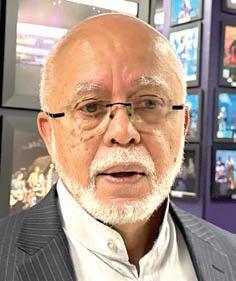
Then, in a cruel twist of fate, Hastings Street, too, was obliterated a few years later, making way for the construction of I-375. This marked the final blow, sealing the fate of Black Bottom and signaling the beginning of the end for Paradise Valley, the Black busi-
Historically, shelters have provided a temporary respite for those in need, often serving as the first or second option after exhausting alternatives like staying with friends or family. Shelters offer a place to rest one’s head and a warm meal, albeit sometimes for extended periods. For others, being unhoused means living in cars or makeshift outdoor
By Samuel Robinson SENIOR REPORTER
Support for the helpline comes from the Gilbert Family Foundation, which has pledged $10 million over three years to fund the program. Wayne Metro Community Action Agency manages the helpline, making it accessible to all Detroit residents. This initiative simplifies access to the City’s various housing services, ensuring that residents in need can easily find assistance.
Fueled by more than $100 million from the Infrastructure Investment and Jobs Act and other partners, this ambitious project aims to create jobs, remove barriers to economic growth, and reconnect the neighborhood with the rest of Detroit. It is a step
Detroit City Councilman Fred Durhal III, representing District 7, where Eastern Market resides, told the Michigan Chronicle, “It’s still very early in the process, MDOT is
He explained, “ We saw numbers downtown that we have not seen, ever. People are emerging from COVID and there’s a feeling that we’re in a post-COVID era… and with the venues downtown and the reasons to come down with all the activities that are going on, we saw hundreds of more people and, in particularly, young folks, teenagers that we hadn’t seen.”
Responding swiftly to the surge in violence, DPD
Councilman Fred Durhal III is the second former mayoral opponent to endorse City Council President Mary Sheffield for Detroit mayor.
By Lynzee Mychael MULTIMEDIA JOURNALIST
The causes of homelessness are as diverse and complex as the individuals experiencing it. In response, the City of Detroit has adopted a holistic approach to combat this issue.
“Providing services and high-quality housing to persons at risk of or who are experiencing homelessness is a key priority of the City of Detroit, said Julie Schneider, Director of Detroit’s Housing and Revitalization Department.
Durhal announced he was backing Sheffield Monday at In Harmony Cafe Sweets & More, a coffee shop on the city’s west side along Dexter Avenue within District 7, the council district he represents. Sheffield’s campaign said the business was chosen because of its location on the boundary line of both leaders’ districts.
“The city and its partners offer a lot of great services to help Detroiters with their housing needs, but they don’t mean much if people don’t know how to access them,” said Mayor Mike Duggan. “Thanks to the efforts of our partners and the generous support of the Gilbert Family Foundation, we now have a simple process to guide residents to the right housing resource and a growing number of programs to help them.”
“This means focusing on building the pipeline of supportive housing and coordinating with the Continuum of Care on the delivery of critical resources such as emergency shelter, rapid rehousing, and diversion and prevention programs. It also means preserving and expanding affordable housing options for Detroiters of all incomes and improving housing stability though comprehensive service offerings available through the Detroit Housing Resource HelpLine and Detroit Housing Services Division within HRD.”
In May 2023, the City of Detroit launched the Detroit

The Gilbert Family Foundation’s broader commitment involves pledging $500 million to support projects across Detroit over the next ten years, with housing initiatives being a significant part of their contribution.
Former candidate Saunteel Jenkins announced her support of Sheffield’s campaign last week.
“I knew if it wasn’t me, I wanted to make sure Detroit was in the best possible place to have experienced leadership,” Durhal told reporters Monday outside the coffee shop. “You heard me talk about it on the campaign trail. Council president has been down there the past 12 years pushing ordinances forward, ensuring that our neighborhoods are taken care of. And so, for me, it’s a no brainer.”
From the days of the Great Migration when thousands of Black families flocked to Detroit in search of jobs and a better life, to the pivotal role they played in the city’s cultural and musical heritage, Black Detroiters have left an indelible mark on the city. However, in recent years, Detroit has experienced significant gentrification, which has raised concerns about the displacement of long-standing Black residents. Similar to a setting sun, there’s a rising spirit, and Black Detroiters are reclaiming their place in the city, despite the challenges posed by gentrification.
Notably, Detroit has witnessed a consistent decrease in recent years, with the number of unhoused residents steadi ly declining. In 2019, approximately 7,847 people were unhoused and entered the City’s community response system. In 2021, about 5,687 people experienced homelessness.
According to the City of Detroit, since the start of the fiscal year 2019 to 2021, Detroit saw a 28% decrease in the
Durhal, a former state representative, said the city can’t afford to put a rookie in the top spot of the largest city in the state of Michigan, saying the wrong leadership could send the city in the wrong direction. He said the venue for the endorsement an-
During the Great Migration, thousands of Black families from the South came to Detroit in search of jobs in the booming automobile industry. Despite facing discrimination and segregation, they built vibrant communities on the city’s east and west sides. Over
nouncement, Monday, in Harmony Cafe, was an example of how businesses away from
because of discrimination, but they were also coming because Black people was doing some stuff. When did Black people start doing things in the city? They started doing things in this area in the 1800’s. In the 1800’s the major thing that they were doing in Detroit is they were the leaders in the fight against slavery. The Underground Railroad
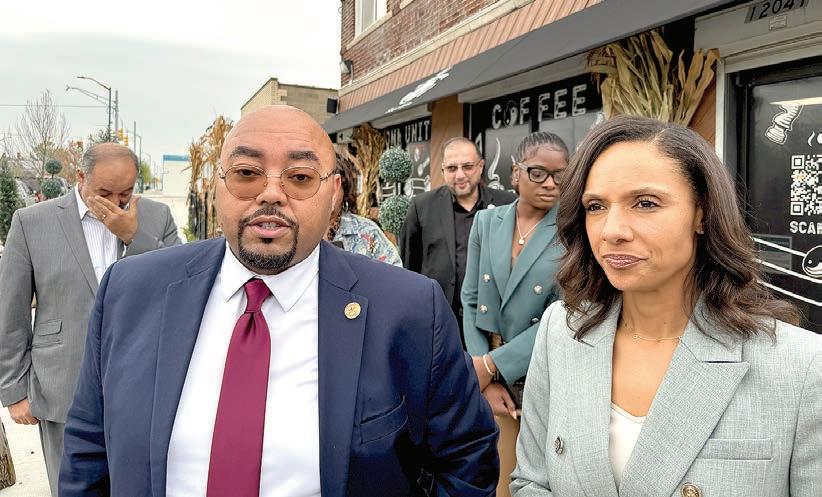
of
cine and healthcare, may be adversely impacted by the decision to overturn Roe v. Wade.
ReproducAll, a affirm abortion and freedom in constitution,” Giroux. is that everything in aborMichigan, makes we will we can patients care they
“Transformationdoesn’t just do certhem view of and exdrive that because what create everyentire because women been premoment of the final. a law1931 law effect, asked the affirm that constitucontain abortion. Our Planned Advocates of founding coalition
Elected officials are also working to keep Roe v. Wade intact thus holding off Michigan’s 1931 trigger ban. Governor Gretchen Whitmer released a statement saying, in part:
and leverage philanthropic and public partnerships to avoid false promises built on uncertain budgets.
She is a proven public servant who brings over a decade of experience navigating Detroit’s complex political landscape. Her career has been shaped by a clear commitment to community investment, legislative advocacy, and equity in development. As City Council President, she has authored and supported dozens of community-centered policies including the Neighborhood Improvement Fund, Home Repair Grants, the Inclusionary Housing Ordinance, and the Right to Counsel legislation that protects vulnerable tenants. Her work has reflected both a grounding in grassroots organizing and a pragmatic understanding of city governance.
“The words ‘Roe overturned’ are no longer theoretical. I want every Michigander to know— no matter what happens in D.C., I’m going to fight like hell to protect access to safe, legal abortion in Michigan…”
ation of a centralized Homeownership and Housing Rights Office to help protect renters and homeowners from displacement. She’s also committed to expanding home repair programs, pursuing property tax reform, and addressing the supply crisis that continues to make Detroit housing unaffordable for too many working families. These plans are grounded in the work she’s already done and the relationships she’s already built.
what the Supreme Court will rule in the upcoming days. Despite the decision, advocates on both sides of the argument are willing to continue their pursuits.
geting is unmatched in this race, and that matters when we’re talking about leading a city with a $2 billion budget and urgent challenges.
As of the time this writing, the two candidates have yet to participate in a public debate, and there is only one confirmed debate scheduled. The voters have been deserving of more head-to-head conversations between the two candidates about the future of this city, but elections are about choices.
Crucially, Sheffield recognizes that too many Detroiters remain disengaged from local government. Her plan to create district-based Neighborhood Opportunity and Empowerment Hubs is not just an outreach effort, but a structural change aimed at bringing government into the neighborhoods. She wants to ensure that everyday Detroiters are shaping policy and accessing services where they live. This kind of citywide infrastructure is long overdue.
On housing, she proposes the cre-
More than legal implications, overturning Roe v. Wade would impact several systems across the spectrum. With the potential to drive both foster and adoption numbers upward, a ban on abortions could leave many women to choose a less safe route restoring ‘back alley’ and illegal abortion practices, including self-abortions. Moreover, African American women and women of color, who already have a long-storied history with access and inclusion in medi-
islature adopts it.
Denzel Anton McCampbell, Bobbi Johnson, Regina Ross, and State Representative Karen Whitsett, making it one of the most closely watched local contests.
Increase school funding: Statutory changes to increase the School Aid Fund revenue by at least $3.6 billion and establish a permanent weighted funding formula based on student and community needs and universal preschool (0-3).
Other council districts with fewer candidates moved directly to the general election ballot, where voters will still weigh in on who represents them for the next four years. The board of police commissioners, a civilian body that oversees the Detroit Police Department, will also see new members chosen this fall. These offices, though often receiving less attention than the mayor’s race, play significant roles in shaping policy, oversight, and neighborhood representation across the city.
Reject censorship in history instruction: Encouraging Gov. Whitmer to ensure the goal for Michigan schools should be history instruction that is presented by professionals with the subject matter expertise, pedagogical skills, and judgment necessary to present complex information to students that
Together, the slate of candidates reflects both continuity and change. Longtime political leaders are vying for higher office while new voices are emerging to represent neighborhoods and advocate for reforms. Detroiters heading to the polls will be casting ballots not only for the city’s top executive but also for the officials who will
“What we are really concerned about is the impact on our patients. Access to abortion is already out of reach for far too many Michiganders, especially Black people and people of color who face additional barriers to care as a result of systemic inequalities and institutional racism. Losing access to legal abortion will impact those communities most, forcing people to become parents or expand their families against their will. Being able to decide and control if, when and how to become a parent is central to building and living a healthy, happy life,” said Vasquez Giroux.
Sheffield also speaks clearly about Detroit’s long-standing budget tradeoffs. She does not offer easy answers, but she does offer practical ones, including a commitment to diversifying revenue sources, advocating for structural tax reform at the state level, and responsibly phasing out unsustainable reliance on corporate tax abatements. She understands that building a more equitable Detroit means playing the long game while still delivering near-term results.
Her record also reflects a willingness to push back when needed. Despite frequent alignment with current Mayor Mike Duggan on key issues, she has shown independence in voting against several administration-backed deals, pushing for increased transparency, and authoring legislation to close the gaps where city programs were falling short. She has been clear that her administration will be distinct in tone and approach, with a stronger focus on equity, inclusion, and neighborhood input. Her understanding of the legislative process and city bud-
Beyond the scope of pro-choice versus prolife, the fight for reproductive choice is one of freedom. As Michigan officials work to ensure each woman who finds herself in the position to choose has access to care without the threat of legal action, many wonder
The health committee recommends reviewing state licensure policies to address the barriers that Black psychologists face in obtaining licensure in Michigan.
“Overturning Roe v. Wade would be a terrible break with nearly 50 years of judicial precedent and – more importantly – a blow against individual freedom. It is my hope that the majority of justices will reject the findings of this draft. If that is not the case, we need to stand with Senate Majority Leader Schumer and Gov. Whitmer in support of their efforts to preserve the right to reproductive freedom,” said Chair Alisha Bell, on behalf of the Wayne County Commission.
Between the remaining candidates, the contrast is clear. Mary Sheffield offers experience, readiness, and a governing philosophy that balances bold action with pragmatic delivery. She won’t need the kind of learning curve that people might think she will. She does not need to guess how city departments work or what state-level advocacy will take. She understands the need to maintain essential city services and improve the quality of life for residents and has the wherewithal to be fiscally responsible in her pursuits. She is ready to lead, and she is prepared to deliver.
We urge Detroiters to vote for Mary Sheffield. Her platform is thoughtful, her record is grounded, and her vision is focused on the people and neighborhoods too often left behind. She has the tools to move Detroit forward — not just downtown, but district by district.
The Michigan Chronicle editorial board proudly endorses Mary Sheffield for Mayor of Detroit.







neighborhoods. We started to see foreclosures, we started to see our neighborhoods have a lot of challenges. Over the past 12 years, what we’ve begun to see is our revitalization here, right here in this neighborhood, right here on Dexter Avenue.”
Durhal told the room full of supporters and District 7 residents that it’s crucial Sheffield is elected the next mayor.
“I am honored to receive the endorsement of my colleague and friend, Council Member Fred Durhal,” Sheffield said in a statement.
return to the polls on Nov. 4 to choose their next mayor and council members. Sheffield faces Triumph Church pastor Rev. Solomon Kinloch in the general election. Durhal is the first council member to endorse a candidate running for Detroit mayor.
District 4 council member Latisha Johnson said earlier this summer she did plan to endorse a mayoral candidate, but thus far has not. District 6 council member Gabriela Santiago-Romero has also said she expects to endorse a candidate, but has not yet done so.
tribution of state health funds: gan communities with a significant Black popu lation receive adequate funds to address mental health issues.
govern at every level of city hall.
Protecting Black voting rights: Urge state officials to remain vigilant in the fight against schemes to disenfranchise Michiganders of color.
For those who prefer voting in person, polling places will open statewide at 7 a.m. on Election Day and close at 8 p.m. The dual options—absentee and in-person voting—reflect Michigan’s ongoing effort to balance accessibility with accountability. The absentee process provides convenience for voters who cannot or prefer not to
“BLAC members have worked hard to identify embraces. transforleadership as a approach that change the syscircumstancoperating Ivory
vote in person, while traditional polling stations continue to serve as a cornerstone of civic participation.
The November 4 general election marks the culmination of countless individual decisions to engage, prepare, and make voices heard.
Ebony JJ Curry can be reached at ecurry@michronicle.com
“Fred has been a strong advocate for his district and the city as a whole, and we share a commitment to uplifting our neighborhoods and ensuring Detroit’s growth benefits everyone. I look forward to continuing our work together and building a future that all Detroiters can be proud of.”
Durhal finished sixth out of nine candidates running for mayor during the primary election on Aug. 5. The city saw 85,971 total voters in the Aug. 5 election. Detroit residents will
Sheffield acknowledged speaking about an endorsement with Johnson, but isn’t actively seeking support from current council members, because they’re in their own races, she said.
“I think our colleagues are focused on their own races,” Durhal said. “I’m not going to be on council in January, so I can step out there adn support from colleague, someone who I’ve had a pleasure working with.” You can reach Sam at srobinson@michronicle.com.


A3 | October 1-7, 2025
By Samuel Robinson SENIOR REPORTER
The battle for the city of Detroit’s votes in the 2026 Democratic primary election for U.S. Senate is being staked out early by U.S. Rep. Haley Stevens, D-Birmingham.
The Congresswoman held a campaign event with supporters from Michigan’s Legislative Black Caucus at Fixins in the city’s historic Paradise Valley neighborhood downtown.
Before the event, she explained her vote to approve a resolution honoring the life of controversial activist Charlie Kirk in an interview with Michigan Chronicle.
“His stuff was odious. I mean, the man spouted racism, sexism, hatred,” Stevens said. “I have voted consistently every chance I’ve got in the Congress to say when someone’s murdered and they’re putting up a thing on the floor, nonviolence. There was a vote in the Senate that will likely make its way to the House. I believe it will. I am not voting for a day of remembrance, but I voted similar to how I did with (Melissa) Hortman, and you could see there was a lot of division. You know, we were really working hard to be united around the budget, and that was something that I think folks were split on. I’m not endorsing anything close to what that guy says — anything.”
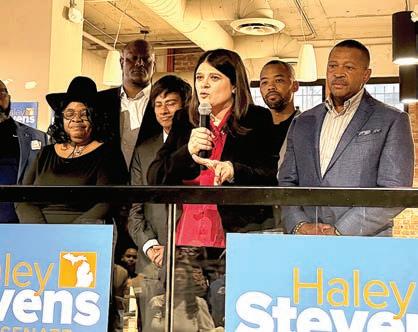
On stage during his remarks, Steven’s congressional colleague and supporter, U.S. Rep. Shri Thanedar, D-Detroit, acknowledged that he had voted against the resolution honoring Kirk because he could not in good faith vote for the resolution, given that he represents the largest African American city in the country.
“He was racist… And by representing the largest Black city in America, I could not in good faith honor this man,” Thanedar said. “Even though I care and I feel empathy for his children and his wife.”
When asked about her efforts to court Detroit voters, Stevens said she’s got the receipts to prove she’s the best candidate to represent local residents in the U.S. Senate.
“I have represented 1.5 million people in Southeast Michigan, parts of Western Wayne County, flipped a seat on liberal Democratic values, and I’m rolling up my sleeves to be Michigan’s next United States Senator, because I want to meet people where they’re at, I want to show them the fire I want to bring to this job, the representation I want to bring to this state,” Stevens told Michigan Chronicle in an interview downtown Detroit Saturday.
Stevens’ primary opponents include former Wayne County Health director Abdul El-Sayed and State Senator. Mallory McMorrow, D-Royal Oak, who represents part of Detroit as part of her senate seat. McMorrow defeated former State Senator. Marshall Bullock, D-Detroit, in a primary after an independent redistricting commission changed the state’s district maps.
Bullock and other Black lawmakers criticized the district boundary changes for minimizing the number of Black-majority districts. But the new maps led to the Democratic Party winning control of the state House and Senate in 2022, before House Republicans won it back last November.
While Stevens has backed House Democratic
See HALEY STEVENS Page A-4
By Ebony JJ Curry SENIOR REPORTER
Wayne State University and Detroit Public Schools Community District are taking a step that could change how Detroit students see their future. The new partnership, called Warriors on the Rise, is built around a promise: if DPSCD juniors and seniors maintain at least a 3.0 GPA and complete core credits in English and math, they are guaranteed admission to Wayne State. No guessing games, no waiting on application decisions, no roadblocks that often stop first-generation or working-class students before they even begin.
The design of the program is simple on paper, but carries weight for Detroit’s education pipeline. College access has long been uneven in the city, where many students carry the desire to pursue higher education but face a maze of financial, academic, and logistical barriers. Wayne State’s new initiative acknowledges those hurdles and goes further than just opening the door. It offers structured year-round support for both students and families—career mentoring, college prep workshops, academic advising, and financial aid navigation. Even practical
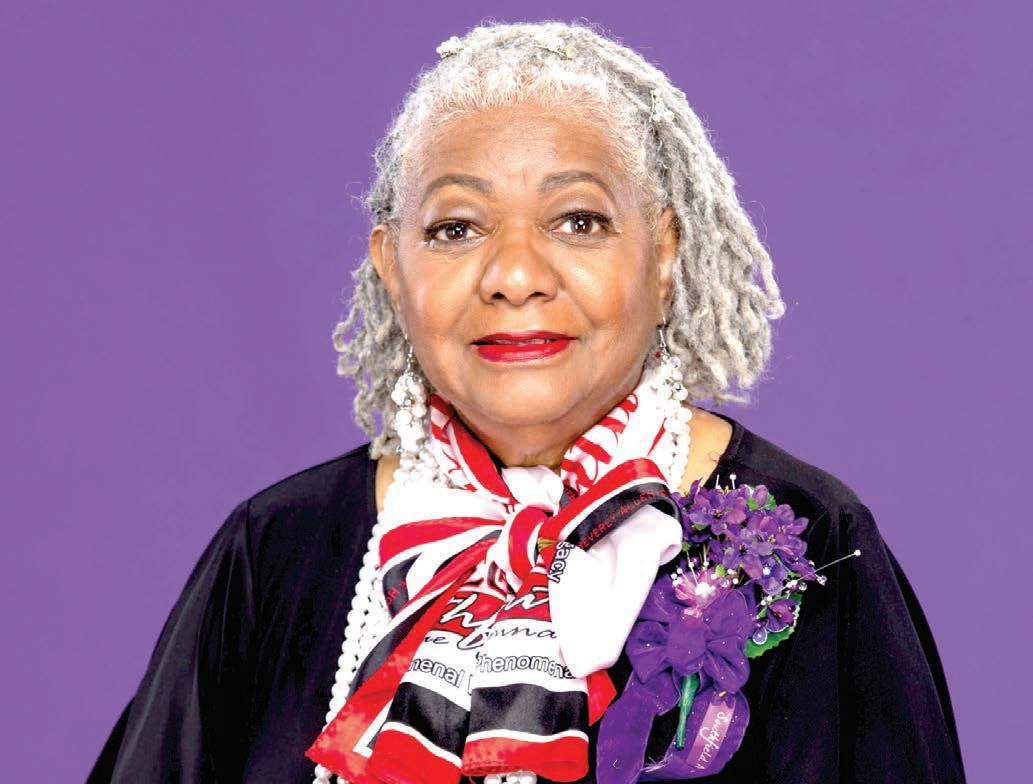
The daughter of political trailblazer Robert Millender carries a family legacy of service into her art, teaching, and community while shaping what aging looks like in Detroit, showing what it means to keep living fully — and to bring others along.
By Ebony JJ Curry SENIOR REPORTER
The music starts, and Patricia Millender is already in motion. Inside a bright room at Detroit’s Hannan Center, she joins other elders stepping through the hustle, a dance she only recently added to her schedule. At first, she could hardly make it halfway through without catching her breath, but now her feet move confidently, her laughter cutting through the rhythm as she keeps pace with the beat.
“At first, I was out of breath halfway through the class,” she said. “But I’m not anymore.”
For Patricia, 77 years old and still curious about everything, staying in motion is not optional. It is often said that if you don’t use it, you lose it, and she knows that truth from the inside out. Aging brings with it the temptation to sit still, to let life slowly pass by. But she has chosen something else entirely—to keep showing up, to keep creating, and to keep giving back.
“My mission is to live life to the fullest, to enjoy it, and to bring some people along with me,” she said.
Her life’s arc bends all the way back to her parents, who first set down roots in Detroit.
“I was born here in Detroit at Henry Ford Hospital and so were all my siblings,” she recalled. “My mother was born in Georgia and my father in Mississippi, but they moved here as young children. And they met at the Greystone Ballroom, which I think a lot of people
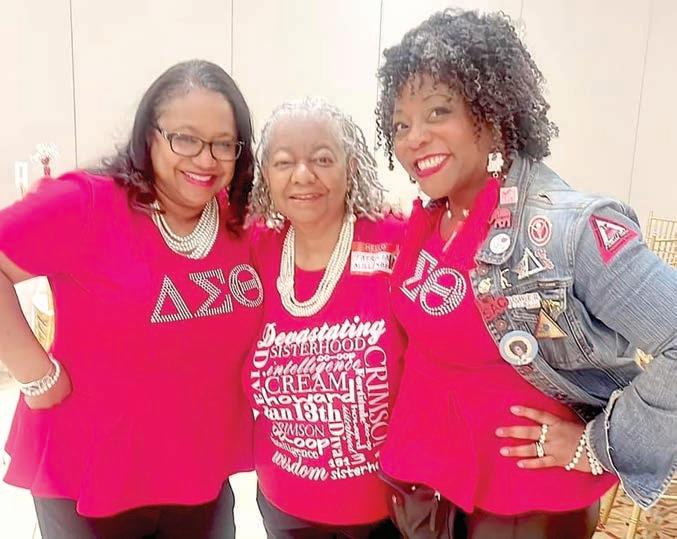
know about the history of that. At that time, Blacks could only go to the Greystone on certain days of the week.”
Their marriage began with joy but quickly intersected with history’s harsh turns. Six days after their wedding, Pearl Harbor was bombed, and her father enlisted. He served in Italy, where he and other Black soldiers discovered a freedom they did not know at home.
“They could walk around Italy, go into restaurants. They weren’t facing any racism. And when they got home, they were going to make sure they worked towards changing America so that soldiers who fought for America could certainly be able to go into any restaurant or club or hotel that they wanted to.”
That experience fueled her father’s determination. When he returned, he worked at the post office, then considered a prized position for Black men, studied at night, and eventually earned

matters like transportation and access to campus events are built into the package, acknowledging the real-life challenges Detroit families face when planning for higher education.
The timeline begins in February 2026, when invitations will reach juniors whose grades qualify them for entry. By March, students must accept and formally join the program, creating a clear entry point. In the
spring, families will be invited to a Welcome Day on Wayne State’s campus to tour facilities, meet mentors, and take part in sessions that explain the academic and financial resources available. Over the summer, social events—from sporting outings to cultural activities—will connect students with their peer mentors. By fall, students will
a law degree. His circle included veterans like Coleman Young, who would become Detroit’s first Black mayor. Robert Millender himself became a prominent political figure in Detroit, and his name lives on in the Millender Center, a downtown landmark.
“That kind of just shapes a little bit of who I’ve come to be, specifically here in the city of Detroit,” Patricia said, reflecting on how his drive for justice and education defined their family. Her sister Beatrice, affectionately called Penni, followed the same path of service, beginning in social work before becoming a judge at Detroit’s 36th District Court. The Millender household was one where ambition was never separated from responsibility.
Patricia’s own path unfolded in
Page A-4
be drawn further into campus life through Warrior Week, career workshops, student activities, and performances. That semester also includes the option to enroll in a dual-enrollment course called College Success for Warriors on the Rise, blending exposure to college-level expectations with continued high school support. The program carries into 2027, with another dual-enrollment course offered in the winter and an Early Assurance Decision Day in the spring to celebrate students committing to Wayne State. For Detroit families, this is not
It’s
about
ers
of
or
relationship to
and
to
to
what can otherwise feel like an insurmountable process. Transportation support through WayneRides removes the added stress of commuting from across the city to Midtown. The program takes into account that a student’s success is deeply tied to whether their family feels included and informed in the process.
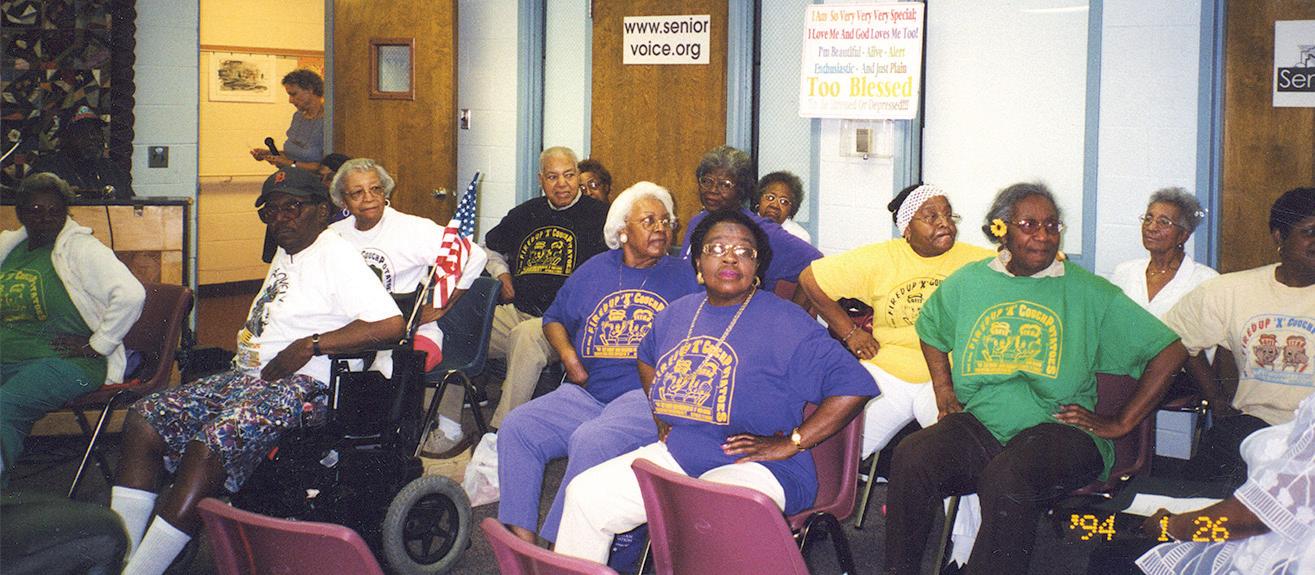
From page A-3
layers. She began as a teacher for profoundly deaf preschoolers, then became an audiologist for Detroit Public Schools, testing hearing loss across the district. Her husband’s job with General Motors took the family first to Mexico and then to Texas, and Patricia carried her talents with her. It was there that she decided to lean fully into her love of art.
“I decided I didn’t want to teach anymore because I was always interested in the arts,” she said. Architecture seemed like a dream until she realized it required another four years of college. “They told me there was a design school about a mile away, and maybe I might be interested in that. So, I went over there, interviewed, and decided I would study interior design instead. It was only a two-year program. I graduated number one in my class.”
That decision carried her to the Tandy Corporation, parent company of Radio Shack, where she joined the design team. “I was on their design team when they started changing their colors from orange to red, black, and gray,” she said, recalling her contribution to a new corporate image. Returning to Detroit, she brought with her an impressive portfolio, so strong that Wayne State University invited her to be a graduate teaching assistant. The offer came with a stipend and free tuition, and she accepted. But when her oldest daughter prepared to leave for college, the reality of tuition bills pushed her back into teaching.
“I needed some real money,” she said with a smile. So, she returned to Detroit Public Schools, where she remained until retirement.
Art, however, never left her side. A ceramics class she took during design school introduced her to Pewabic Pottery, where she studied for 25 years, creating pieces that became extensions of her curiosity. Quilting came next, sparked by a sorority sister’s invitation to a show. “I went to a quilt show and joined the quilt group the next month,” she said. “And I’ve been a member ever since.” She is still active in that circle, and this very month she and her peers are installing 140 quilts for exhibition.
said, her voice soft with memory.
That impulse to keep giving and to keep moving forward is what brought her to the Hannan Center 15 years ago. Founded in 1925, Hannan is one of the city’s oldest nonprofits dedicated to serving older adults, designed to combat the isolation that can come with aging. Patricia has become one of its most dedicated members.
“Everything that they have, I take classes,” she said. “Yoga, different dance classes, fragrance classes, history classes about Black history, painting classes, drawing classes. I’m just that curious. And I’ve always been that busy a person.”
Her art has been shown in exhibits hosted by the center, and she has forged friendships that make the place feel like a second home. “The people there are just marvelous. Everybody needs to belong to some place that’s wonderful and giving and loving. And that’s Hannan Center.”
“At Hannan we see every day how our programs spark growth and connection,” said Hannan Center CEO Vincent Tilford. “Participants like Patricia Millender show what’s possible joining art workshops, lively discussions and creative projects that invite older adults to learn and connect and create alongside like-minded lifelong learners. Their enthusiasm reminds me that Hannan is more than a place, it’s a community where curiosity and creativity never have to retire.”
For Patricia, the Hannan Center has allowed her to expand her world even further, connecting her to institutions like the DIA and Charles H. Wright Museum in new ways and creating space for her to share those experiences with her grandchildren. She sees her life not as winding down but as expanding. “If you give back, there’s no way your life can’t be better,” she said. “Because then you don’t worry so much about, oh, my back hurts today or my hip hurts, because that’s certainly a part of aging. Don’t get me wrong. My back is hurting right this minute. But I go to the doctor, take care of it, and keep on pushing.”
From page A-3
The benefits are designed to be both practical and cultural. Every participant will be matched with a Wayne State Riser, a peer mentor who offers guidance on academics, navigating campus, and preparing for a career path. Families will have access to financial aid sessions, while students will take part in academic advising, career workshops, and optional dual-enrollment courses that allow them to earn credits before graduation. Cultural access is also emphasized, with free or discounted tickets to campus events and activities. Transportation support ensures that getting to and from campus is not an obstacle. Together, these supports are structured to create early preparation for the college experience in a way that builds confidence and belonging.
The term “assured admission” has a weight of its own. Too often, students second-guess whether they belong at a major university, especially one in their own city. Warriors on the Rise is meant to cut through that self-doubt with a straightforward guarantee: if you do the work in high school, the door at Wayne State is open. For those who might fall just shy of the 3.0 GPA mark, Wayne State notes that they are still encouraged to apply and will be reviewed holistically. The goal is not exclusion but encouragement, reinforcing that one number does not define a student’s potential.
imagine future pathways, and student activities that build a sense of belonging. These touches matter in a city where many young people juggle work, family obligations, and personal struggles on top of school. To know that a system is built around supporting them, rather than testing them at every corner, is its own form of empowerment. The assured admissions model is not new nationally, but its application in Detroit is uniquely tailored. By targeting DPSCD students directly, the program signals a commitment to public school students who too often are told that college is beyond reach. With Detroit’s public school system still rebuilding trust after decades of financial and structural challenges, this partnership carries symbolic weight. It suggests that the city’s largest research university and its school district are aligning priorities in a way that centers student opportunity.
NOTICE OF REGISTRATION FOR THE MUNICIPAL PRIMARY ELECTION TO BE HELD ON TUESDAY, AUGUST 5, 2025
DETROIT, MICHIGAN
TO THE QUALIFIED ELECTORS OF DETROIT, MICHIGAN:
Patricia’s devotion to community has been steady. She has been an active member of Delta Sigma Theta Sorority, Inc. for 57 years, a Girl Scout leader for her daughters and later her granddaughters, and for three decades she sang in her church choir.
She believes in surrounding herself with youth as a way of keeping her own spirit alive. “When you’re around young people, you don’t get old,” she said. Her grandchildren are the center of that energy. She takes them to the Detroit Institute of Arts, to the Charles H. Wright Museum, and to the Science Center. She even loaded them onto a train for a trip to Chicago, where they spent an entire day at the aquarium. “We just all fell in love with the aquatic animals,” she
From page A-3
leadership, McMorrow and El-Sayed have suggested it’s time for the Democratic Party to usher in new leaders in Congress.
Stevens’ campaign has so far focused its messaging toward a potential Republican opponent, former U.S. Rep. Mike Rogers, whom she could face if both advance past their party primaries.
On Saturday, Stevens said the president is enacting reckless tariffs and doing billionaire giveaways on tax cuts, “and rising prices on everybody else.”
“Right now, you’re seeing my leadership in the Congress focused on health care costs,” Stevens said. “For people right now, it is honestly just this frustration of, like, ‘What’s going on in my pocketbook?’”
Stevens thanked attendees on stage, including Pontiac representative Brenda Carter, Lathrup Village mayor Kelly Garrett, and Saginaw rep. Amos O’Neil, Detroit rep. Tyrone Carter, Madison Heights councilman, Quinn Wright, Macomb County commissioner, Michael Howard, and Detroit fire chief James Harris, an at-large candidate for Detroit City Council.
“My dad was born here in Detroit,” Stevens said. “He started a small business with my mom when they were in college — it was a landscaping business… Because we all know you gotta work hard to earn a living, he was also sometimes a school teacher.”
Stevens said it was her parents who instilled in her a sense of work ethic that led her to work for President Barack Obama’s administration to help with the auto industry bailout.
“What was going on on Wall Street was causing so many problems, and yet, General Motors and Chrysler were going to go bank-
Even as she fills her days with dance, pottery, and quilting, Patricia carries the weight of history’s warning. She is deeply concerned about America’s political direction. “My major concern is what’s going to happen to America. Is fascism going to take over?” she asked.
She remembers meeting Holocaust survivors, seeing the tattoos on their arms, and listening to their stories. “This scares me. My parents fought too long, and my dad spent too much of his money for us to have to start all over again. So, I’ll keep doing my part. I’ll be marching when they ask us to march. I’m kind of old to be marching, but if I can hustle for an hour, I can march.”
There is also a generational component to consider. If this program succeeds, it has the potential to alter how Detroit families think about higher education in the long run. A younger sibling watching their older brother or sister transition smoothly into Wayne State may begin preparing earlier, knowing that the path is real and supported. For parents, the experience of navigating college applications, aid, and enrollment once with a clear support system may make it easier to repeat the process with younger children. In a city where cycles of poverty and underinvestment have been difficult to break, creating new cycles of access and expectation could be transformative.
PLEASE TAKE NOTICE that any qualified elector of Detroit, Michigan who is not already registered, register to vote at the office of the Detroit Department of Elections, the office of the Detroit City Clerk, the office of the County Clerk, a Secretary of State branch office, or other designated state agency. Registration forms can be obtained at mi.gov/vote and mailed to the Detroit Department of Elections or the Detroit City Clerk’s Office. Voters who are already registered may update their registration at www.expressSOS.com
Her grandchildren, all advanced placement students in high school, remain her deepest hope. She wants them to inherit not money but richness of spirit and opportunity. “I want them to live a life as rich as my life has been. And I don’t mean with money.” That richness, for her, is measured in education, art, and community, the very things that carried her from Henry Ford Hospital in 1948 to the dance floor of the Hannan Center in 2025.
Education leaders behind the program frame it as a way of investing in Detroit’s young people while keeping talent close to home. Detroit has no shortage of students with ambition, but many end up leaving for colleges out of state or opting out of higher education altogether because the path feels too costly, confusing, or closed off. By making the process transparent and accessible, Wayne State is betting on a generation of Detroit students who can picture themselves on campus long before high school graduation.
The last day to register in any manner other than in-person with the local clerk is Monday, July 21, 2025
rupt, and with that, we were going to lose hundreds of thousands of Michigan jobs,” Stevens said. “We made it through the time that called for Detroit’s grit, resilience and determination.”
Stevens compared the effects of the Trump administration’s tariff policy to the auto industry collapse after the 2008 financial crisis, saying that what’s going on today is “a man-made crisis.”
Department of Elections
Patricia Millender lives with the conviction that one life, lived in full color, is enough. From the Greystone Ballroom where her parents first met, to the pottery wheels of Pewabic, to the quilt shows she still helps hang, to the hustle lessons that keep her moving, she embodies a truth that resonates across generations: life will keep giving as long as you keep using it. And so, she does, every single day.
Ebony JJ Curry can be reached via email at ecurry@ michronicle.com
HOURS OF OPERATION:
“It’s not a great recession, it’s a billionaire with a chainsaw.”
Stevens pointed to rising health care costs and the $1.3 trillion in credit card debt, saying America is in an affordability crisis.
“We need a tax code that works for us, not the five billionaires in this country.”
Former House Speaker, State rep. Joe Tate, D-Detroit, who endorsed Stevens shortly after backing out of his own U.S. Senate campaign, suggested at Fixins Saturday that Stevens is the candidate that best represents the interests of Black voters.
The academic benefits are clear, but the program also aims to foster community and identity. Dedicated peer mentors will walk alongside each student, not only helping with coursework but modeling how to navigate the broader experience of college. The support stretches beyond academics to career exploration, workshops that help students
After this date, anyone who qualifies as an elector may register to vote in person with proof of residency 168.492) at the Detroit Department of Elections or the Detroit City Clerk’s office.
City Clerk’s Office (Coleman A. Young Municipal 2978 W. Grand Blvd. 2 Woodward Ave. Ste. 106 Detroit, MI 48202 Detroit, MI 48226
As invitations go out in 2026, the first class of Warriors on the Rise will serve as the pilot for whether the initiative works in practice as well as it does on paper. Success will be measured not only by how many students enroll at Wayne State but also by how many persist and graduate, equipped with degrees that translate into real opportunities. If it works, it may become a model for other Michigan universities to adopt with districts across the state, scaling what begins here in Detroit into a broader movement for equity in higher education.
Ebony JJ Curry can be reached at ecurry@michronicle.com
• Regular business hours: Monday through Friday from 8:00 a.m. to 5:00 p.m. (Department of Elections)
• Monday through Friday from 9:00 a.m. to 4:00 p.m. (City Clerk’s Office)
TO THE QUALIFIED ELECTORS OF DETROIT, MICHIGAN:
PLEASE TAKE NOTICE that any qualified elector of Detroit, Michigan who is not already registered, may register to vote at the office of the Detroit Department of Elections, the office of the Detroit City Clerk, the office of the County Clerk, a Secretary of State branch office, or other designated state agency. Registration forms can be obtained at mi.gov/vote and mailed to the Detroit Department of Elections or the Detroit City Clerk’s Office.
• Saturday, August 2nd from 8:00 a.m. to 4:00 p.m. and Sunday, August 3rd from 9:00 a.m. to 4:00 p.m. (Department of Elections)
• Monday, August 4th – Absentee Voting ceases at 4:00 p.m.
Voters who are already registered may update their registration at www.expressSOS.com.
• Election Day, Tuesday, August 5th from 7:00 a.m. to 8:00 p.m.
The last day to register in any manner other than in-person with the local clerk is Monday, October 20, 2025. After this date, anyone who qualifies as an elector may register to vote in person with proof of residency (MCL 168.492) at the Detroit Department of Elections or the Detroit City Clerk’s office.
PLEASE TAKE NOTICE that the City of Detroit will be voting in the Primary Election for the following offices:
• Mayor
Department of Elections City Clerk’s Office (Coleman A. Young Municipal Ctr.) 2978 W. Grand Blvd. 2 Woodward Ave., Ste. 106 Detroit, MI 48202 Detroit, MI 48226
HOURS OF OPERATION:
• Regular business hours: Monday through Friday from 8:00 a.m. to 5:00 p.m. (Department of Elections)
• City Council At Large
• Monday through Friday from 9:00 a.m. to 4:00 p.m. (City Clerk’s Office)
• City Council District 2
“We need people that are going to fight, but we also need people that are going to be a part of the team and are going to look out for our best interest,” Tate said.
• Saturday, November 1st from 8:00 a.m. to 4:00 p.m. and Sunday, November 2nd from 8:00 a.m. to 4:00 p.m. (Department of Elections)
• Monday, November 3rd – Absentee Voting ceases at 4:00 p.m.
• City Council District 5
• Election Day, Tuesday, November 4th from 7:00 a.m. to 8:00 p.m.
• City Council District 7
“The person in this race who is going to be able to do that is Haley Stevens.”
Tate said Black Americans are watching their rights being taken away.
PLEASE TAKE NOTICE that the City of Detroit will be voting in the Municipal General Election for the following offices:
• Mayor
• City Clerk
• City Council At Large
• City Council (Districts 1-7)
• Police Commissioner (Districts 1-7)
• Community Advisory Council (Districts 4, 5, 7)
Persons with disabilities needing accommodations should contact the Department of Elections at 313-876-VOTE (8683).
“We’re seeing not only those opportunities that have been a part of our government institution to help the Black community, and we’re actually seeing our history erased,” Tate said.
“Everyone from Medgar Evars to slavery, that there’s some sort of revisionist history… Who are going to be the one’s who are going to be able to push back and say, no, this is not right?”
You can reach Sam Robinson at srobinson@michronicle.com.
Persons with disabilities needing accommodations should contact the Department of Elections at 313-876-VOTE (8683).

JANICE M. WINFREY
Use your Smartphone’s camera to scan the below QR Code for more access! Be sure to sign up for
A5 | October 1-7, 2025
By Dr. Anthony Kellum
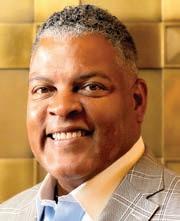
Over the past six decades, the African American community has made significant strides toward homeownership, building generational wealth and stability. Yet, the current political climate, particularly under the Trump administration’s push to roll back housing protections, threatens to undo these hardearned gains.
The Political Landscape and Its Impact
Recent policy shifts have aimed to dismantle key housing protections that were designed to promote fair lending and equitable access. This includes potential rollbacks of the Fair Housing Act and the Community Reinvestment Act, which have historically been crucial in addressing housing discrimination and ensuring that Black communities have fair access to mortgages.
The Importance of Homeownership
Homeownership is more than simply having a roof over one’s head; it is the cornerstone of economic security and social mobility in America. It provides a stable environment for families and a foundation for intergenerational wealth. A home is an appreciating asset one that not only provides shelter but also creates an opportunity to build equity over time. That equity can be leveraged for education, entrepreneurship, retirement, or to weather unexpected financial storms. For African Americans, the significance of homeownership carries even greater weight because of how long access to it was deliberately denied.

For decades, Black families were excluded from mortgage credit and locked out of desirable neighborhoods through redlining, racially restrictive covenants, and predatory lending. These discriminatory practices robbed generations of the chance to build wealth in the same way many white families did. As a result, today’s racial wealth gap is not accidental, it is the cumulative effect of denied opportunities.
Yet when African Americans own homes, the benefits extend far beyond the individual household. Ownership brings stability to families, reduces the risk of displacement, and anchors communities. Children are more likely to do better in school, graduate, and pursue higher education. Neighborhoods with higher rates of ownership often enjoy lower crime rates, stronger civic engagement, and higher property values, all of which reinforce a cycle of empowerment.
Homeownership is also the foundation of intergenerational wealth, the ability to pass down not just money, but an asset that grows in value and creates opportunity for the next generation. This is especially critical for Black families, where the absence of inherited wealth has meant starting from scratch, generation after generation. A home changes that equation: it provides collateral, financial flexibility, and most importantly, the chance to leave something tangible behind.
In this way, homeownership is not just about financial transactions, it is about dignity, stability, and power. For African Americans, achieving and sustaining homeownership is a direct challenge to centuries of exclusion. Every home purchased is more than a milestone for one family; it is a step toward closing the racial wealth gap and rewriting the narrative of what economic empowerment looks like in Black America.
Standing Up and Fighting Back
In this critical moment, it’s vital for the Black community to stay politically engaged and vigilant. Advocacy and activism are key. By participating in local and national political processes, advocating fair housing policies, and supporting leaders who prioritize equity, we can protect the progress we’ve made and push back against policies that threaten it.
Tips for Empowerment and Action
Stay Informed and Engaged – Follow policy
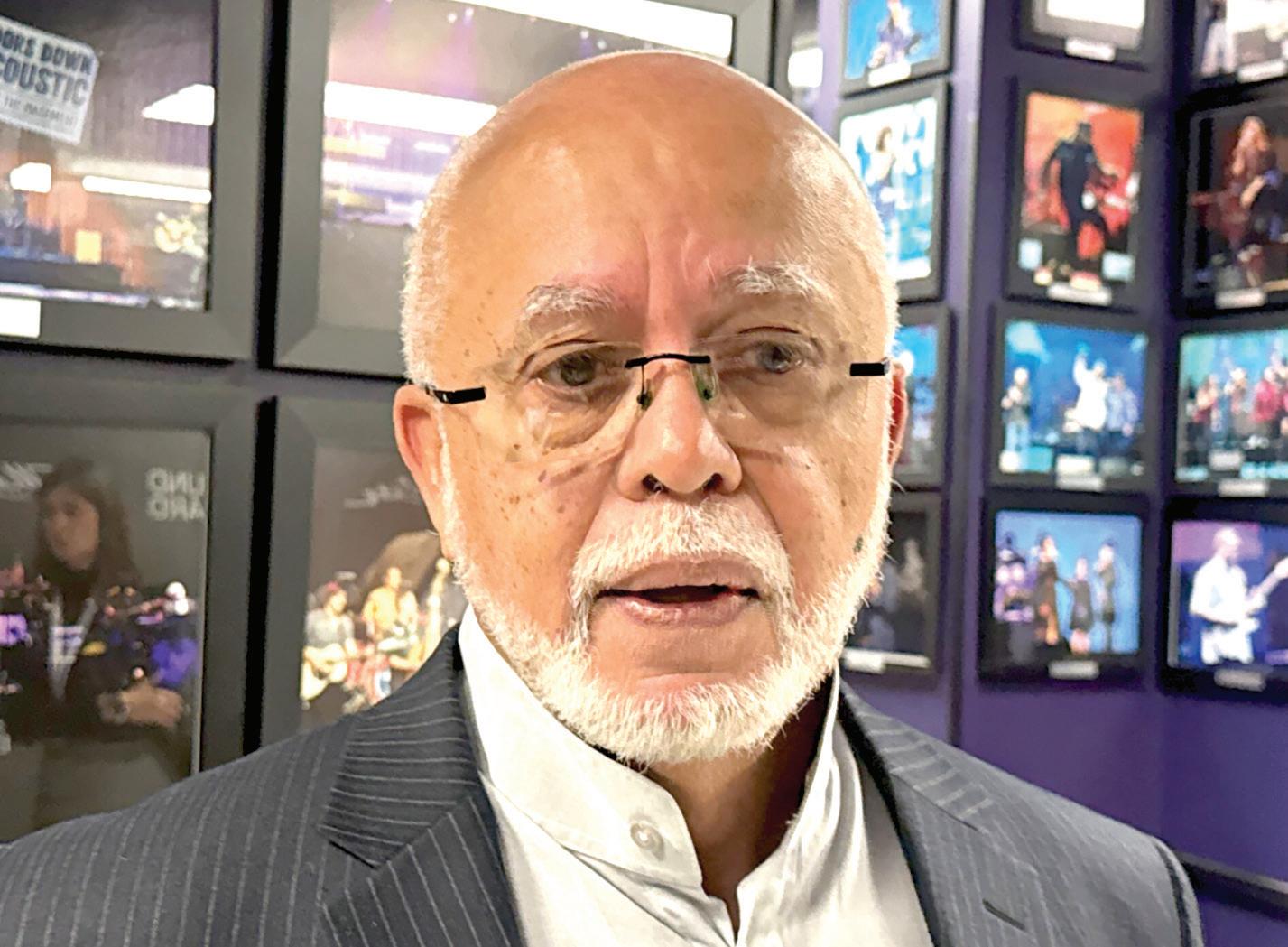
Wayne County received a vote of confidence via a new report from a credit rating firm that shows the county is in a strong financial position.
The rating agency based the improved rating on Wayne County’s reserves, reduced liabilities, and economic growth.
Moody’s Ratings has upgraded the County’s issuer rating and its general obligation bonds to Aa3 from A1, citing Wayne County’s strong reserves, declining long-term liabilities, and growing economic base.
The upgrade marks Wayne County’s continued upward trajectory in fiscal health. Wayne County was on the brink of bankruptcy about 10 years ago.
Since 2021, the County’s available fund balance ratio has climbed from 42% to 72%, while liabilities have dropped to their lowest level in decades, Wayne County officials said in a release.
Moody’s also credited the county’s disciplined budgeting, improved pension and
retiree healthcare contributions, and a growing regional economy as reasons for the stable outlook.
“Nearly a decade ago, Wayne County was on the brink of insolvency,” said Wayne County Executive Warren C. Evans. “Today, national credit agencies are recognizing what we already know; Wayne County is financially strong, stable, and positioned for long-term success. This upgrade is the product of responsible budgeting, tough decisions, and a team committed to serving our residents. It’s proof that when we stay disciplined, we can turn crisis into stability and stability into strength.”
Moody’s assigns issuer ratings to US cities and counties, ranking their creditworthiness using a standardized ratings scale which measures expected investor loss in the event of default.
Wayne County, home to 1.8 million residents across 34 cities and 9 townships, is one of the nation’s largest counties. The Aa3 rating places the County’s
credit among the strongest in Michigan and reflects a decade-long trend of fiscal recovery.
Wayne County has received another major vote of confidence in its financial turnaround. Moody’s Ratings has upgraded the County’s issuer rating and its general obligation bonds to Aa3 from A1, citing Wayne County’s strong reserves, declining long-term liabilities, and growing economic base.
The city of Detroit also received a credit upgrade earlier this summer from the credit rating agency for the 11th year in a row.
“This is what happens when elected leaders set aside us-versus-them politics and work together,” Detroit Mayor Mike Duggan said in a July statement. “Our CFO team, department heads and City Council all have demonstrated tremendous fiscal discipline over the past 11 years to help bring us to where we are today and to lay a strong foundation for years to come.”
By Ebony JJ Curry SENIOR REPORTER
Kenneth Kelly, chairman and CEO of Detroit-based First Independence Bank and chair-elect of the American Bankers Association, testified this month before the U.S. Senate Banking Committee on the future of deposit insurance. Representing the ABA, Kelly outlined ten recommendations from a task force he chaired beginning in January that call for modernizing a system created in 1933 and tested anew by the failures of Silicon Valley Bank and other institutions in 2023.
Kelly told lawmakers that deposit insurance has been one of the most important stabilizing forces in U.S. financial history. Created during the Great Depression after thousands of banks failed and wiped out the savings of everyday Americans, the Federal Deposit Insurance Corporation was designed to restore trust.
For more than 90 years, the FDIC has guaranteed deposits up to a set limit, currently $250,000, ensuring that families and businesses can keep their money in banks without fear of losing it overnight. The system, Kelly noted, is not taxpayer-funded but is fully financed by bank assessments.
“The deposit insurance system has served the nation well, and Americans appreciate the peace of mind they receive from having their hard-earned funds in an FDIC-insured bank,” Kelly said. “We recognize, however, that recent events have raised legitimate questions about whether the system can be improved to reflect the realities of banking today.”
Those questions came into sharp focus in March 2023, when Silicon Valley Bank collapsed after a sudden run drained tens of billions in deposits in less than 48 hours.
The bank’s failure was the second-largest in U.S. history and was followed by the closure of Signature Bank days later.
While regulators stepped in to guarantee all deposits and stabilize markets, the events shook public confidence and forced
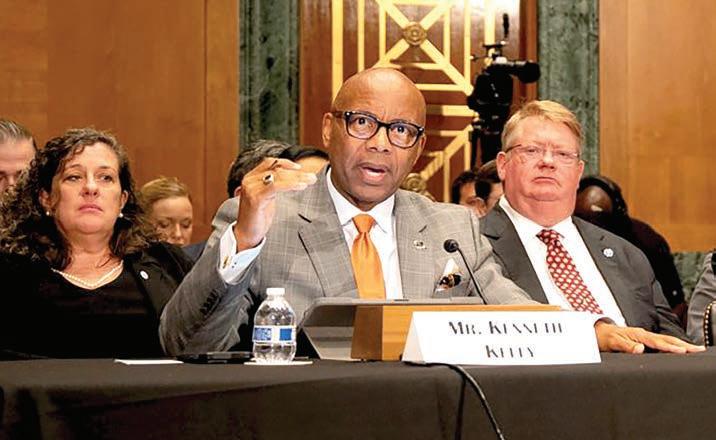
policymakers to consider whether deposit insurance was keeping pace with an economy where technology allows panic to spread in seconds.
Kelly pointed to that moment as the catalyst for the ABA’s internal review.
The association convened more than 300 member banks to debate reforms. A smaller task force, chaired by Kelly, translated those discussions into ten recommendations. He told senators the goal is to make the system more transparent, more flexible in moments of stress, and fairer across institutions of different sizes.
One of the most significant proposals calls for Congress to give the FDIC standing authority to back deposits or other liabilities during a crisis, without having to seek emergency approval in real time. Similar measures were granted during the pandemic, and Kelly argued that codifying this authority would allow regulators to act faster and prevent contagion from spreading across the financial system.
Transparency is another priority. Kelly testified that the FDIC should be required to explain the criteria it uses to determine systemic risk and how it calculates special
assessments on banks after a failure. Following Silicon Valley Bank’s resolution, many community banks argued they were unfairly burdened by assessments despite having no role in the crisis.
On coverage levels, Kelly said the ABA is not ready to endorse a specific increase beyond the $250,000 cap. While most individual accounts fall within the current limit, many businesses, nonprofits, and municipalities hold balances far higher. Additional coverage, Kelly said, could enhance stability, but policymakers need better data to understand the tradeoffs. The ABA recommends the FDIC collect that information and, if a new limit is set, index it to inflation so it does not lag behind economic realities.
Kelly also pressed for a reassessment of the Deposit Insurance Fund, which paid for Silicon Valley Bank’s resolution. No taxpayer dollars were used; the costs came entirely from the fund, which is bank-financed. The ABA is calling for changes that include restoring the tax deductibility of bank assessments, which ended in 2018, and studying whether banks should be allowed to offer targeted excess deposit

insurance for customers who regularly hold balances above the federal cap.
On the issue of resolving failed banks, Kelly testified that the current law prioritizes the “least cost” method. He urged Congress to broaden that test to also weigh community impact, especially when small banks serving specific neighborhoods are at risk. The task force further recommended opening FDIC asset auctions to a wider set of investors and requiring the agency to publicly release the resolution strategies it considered, along with projected costs.
“The deposit insurance and resolution framework, which lies at the core of money and banking in the United States, is complex, multifaceted and foundational to our financial system and the U.S. economy,” Kelly said. “These recommended changes would make the existing system more responsive in moments of financial stress, more transparent and fairer to the institutions participating in the system and the customers they serve.”
The testimony also carried weight beyond financial policy. First Independence Bank, founded in 1970, is one of the nation’s largest Blackowned banks and has long been a financial anchor in Detroit. Kelly’s leadership role as both a community banker and the incoming head of the ABA signals the importance of ensur-
ing reforms do not solely serve the largest institutions but also protect smaller banks that provide access in historically underserved communities.
That perspective matters in Detroit, where access to fair and reliable banking has been a longstanding challenge. Black-owned institutions like First Independence have played an outsized role in supporting small businesses, churches, and families who often faced discrimination at mainstream banks. As the Senate weighs reforms, Kelly’s testimony positioned community banks as central to maintaining confidence and equity in the system.
While some of the ABA’s recommendations would require congressional action, others could be adopted directly by the FDIC. Lawmakers on the Banking Committee are expected to continue discussions in the coming months, but Kelly’s testimony has already established a blueprint for debate.
The question now is how Congress and regulators will act on the lessons of the past two years. For Kelly, the task is to ensure that a system built in the depths of the Great Depression can meet the speed and scale of modern banking while protecting both Wall Street institutions and neighborhood banks in Detroit.
Ebony JJ Curry can be reached at ecurry@michronicle.com
and community involvement.

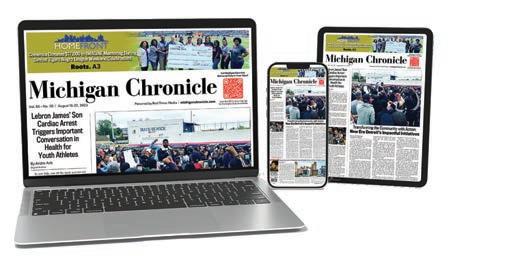


By Samuel Robinson SENIOR REPORTER
Former Detroit City Council candidate Esther Haugabook is ending her write-in campaign, she said, which was encouraged by District 5 residents who weren’t satisfied with either candidate in the general election.
UAW retiree Renata Miller and Board of Police Commissioner Willie Burton face each other in Detroit’s Nov. 4 general election.

“Rather than remain in the City Council race, I will focus on ensuring that the issues I’ve championed — housing affordability, homeowner protections, equitable development, and transparency — are at the center of Detroit’s agenda,” Haugabook said. “I am committed to working alongside leaders, including the incoming Mayor, to advance these priorities for District 5 and for our city as a whole.”
Haugabook launched her write-in campaign on Sept. 16 after finishing third in the District 5 primary behind Burton. She said in a statement on Wednesday that she’s keeping the door open for another run for council in 2029.
The housing advocate said her decision not to mount the write-in campaign was not a concession, but a redirection.
“I want to thank everyone who believed in my candidacy and in the vision we put forward. Together, we have raised the right issues and created a stronger foundation for Detroit’s future. Detroit needs all of us — working together, holding leaders accountable, and making sure our neighborhoods are not left behind. That commitment does not end here.”
Miller, 57, has been endorsed by Detroit council members Mary Waters and Scott Benson, the UAW, The Black Slate, and the Michigan Regional Council of Carpenters and Millwrights.
Burton, 46, has been endorsed by the Detroit After Party. Former House Speaker Rep. Joe Tate, D-Detroit, told Michigan Chronicle last week he is supporting Burton’s campaign.
District 5 is one of the most active council districts, as the majority of the new development in the city happens there. The district contains most of downtown and Midtown, crossing both the east and west sides of the city.
The district covers Belle Isle to Dexter-Linwood, spanning across West Village, Indian Village, downtown, Brush Park, Boston Edison, New Center, and the North End.
The district is home to important landmarks, including the Renaissance Center, Eastern Market, Ford Field, Henry Ford Hospital, the DMC, the DIA, Charles H. Wright Museum, and the Dequindre Cut. Wayne State will move from District 6 to District 5 as a result of redistricting changes.
Council president Mary Sheffield became the youngest council member in the city’s history when she was elected in 2014 at 26. She was selected council president by fellow council members in 2022 after winning a third term in District 5. The council president said she’s spoken to several candidates who intend to run for her seat, but wouldn’t be endorsing a candidate.
You can reach Sam at srobinson@michronicle. com
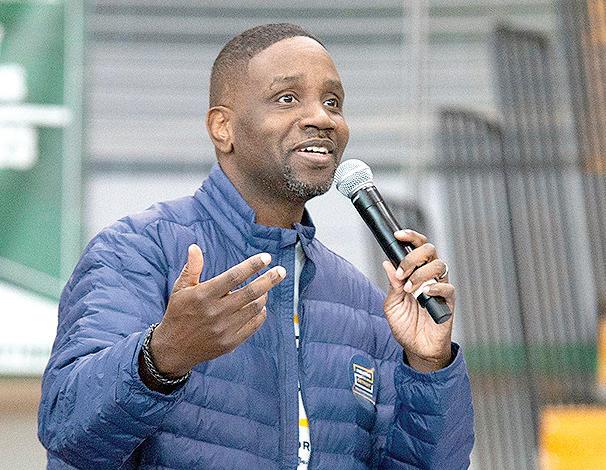
By Samuel Robinson SENIOR REPORTER
Triumph Church pastor Rev. Solomon Kinloch said he wouldn’t run a negative campaign, but his statements about his opponent in the last few weeks have been anything but positive.
On Monday, in response to reporting from the Detroit Free Press that questions whether city council president Mary Sheffield broke city ethics rules by requesting and accepting six Jeezy tickets from Comerica Bank. The city charter strictly prohibits elected officials from taking gifts.
Detroit Corporation Counsel Conrad Mallet said Monday there was no ethics violation. Mallet is a longtime ally of Mayor Mike Duggan, who has endorsed Sheffield.
“Detroiters still carry the scars of systemic corruption,” Kinloch said in a press release Monday. “That culture of corruption bankrupted our city and destroyed public trust. We rewrote the charter in 2012 to stop it. But here we are again, watching leaders trade their public office for personal perks.”
Robin Kinloch, the wife of the pastor, also received free tickets from Comerica Bank, the Free Press reports.
Kinloch’s campaign outlined in a press release what it says is a pattern of corruption from Sheffield.
Kinloch also pointed to Sheffield’s role on the Riverfront Conservancy Board during the $40 million embezzlement, which she has said wasn’t the
By Hon. Scott Benson DETROIT CITY COUNCILMEMBER
If the last couple of weeks have taught us anything, it’s that we need to learn to disagree better.
In the aftermath of the high-profile murder of a notorious MAGA media figure, and with the President of the United States (POTUS) heightening tensions by trying to blame the killing on the “radical left,” Utah Governor Spencer Cox showed bravery and leadership by standing up and saying no to hate. While POTUS’s inflammatory rhetoric is not going to unite a country that is on the edge, Governor Cox is one of the few high-profile Republicans who is actively trying to dial the temperature down.
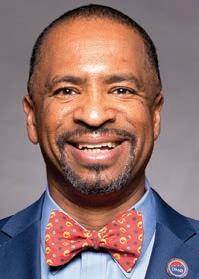
Cox was urging people not to play the blame game, and that the shooter was the only person responsible for this heinous crime. In other words, he was doing what a decent and good leader does at a time like this: dialing the temperature down, while POTUS is doing the exact opposite. Cox was chair of the National Governors
Scott Benson
Association when he launched an initiative called Disagree Better. Now an independent nonprofit, Disagree Better uses campaigns, partnerships, and real conversations to show what respectful disagreement looks like in action. It offers tools and resources to build meaningful, constructive dialogue. It also has a toolkit so parents can teach their children these important skills. As the organization’s motto says, democracy is disagreement. And as I like to say, successful democracy is disagreement without violence.
Disagree Better urges people to be curious, not caustic. It teaches people to respect the opinions of others, rather than shout them down. Disagreement is not an act of war, but a way to learn. It isn’t necessarily about being nicer to each other, but it is about finding a way to use disagreement to move toward compromise and solutions to the problems we face as a country. See President Obama and former House Speaker John Boehner. Today, too much of the discourse around politics is toxic. We talk over and yell at each other. We want to “win” every political argument, no matter the cost. And

fault of board members.
Sheffield’s campaign responded to the accusations, saying Sheffield’s actions didn’t violate the ethics code in the city’s charter, which bans “public servants” from accepting anything of value from any person or company doing business or seeking to do business with the city.
“Comerica has, on occasion, offered me tickets to events they believed I might be interested in attending,” Sheffield told the Free Press. “In this instance, I inquired about tickets after receiving several requests from community members and supporters of our neighborhood events. I did not use the tickets myself — they were given to two community members with a history of giving back to Detroit and its residents.”
Comerica Bank is not currently in business with the city of Detroit, though it has been in the past.
“Our opponent is coming to the realization that he has a fledgling campaign with no record on which to run on,” Sheffield’s campaign manager, Chris Scott, said in a statement to Michigan Chronicle. “As a result, he has unfortunately chosen to sow doubt through misinformation and misrepresentations in an effort to dishonestly sway voters. We’re 100% confident that Detroiters will see right through these tired old political tactics and choose real leadership on Election Day.”
Kinloch, the UAW-backed pastor who made it through the primary with 17%, compared to Sheffield’s near 51%
social media is not helping, as we are forced to sort through disinformation and distortions in search of the truth. Polarization has become a political strategy, deepening with each day that passes, while we have political leaders who paint each other as mortal enemies.
This past week, I heard a lot of pundits and elected officials saying, “this is not what our country is about,” but that showed a great lack of historical understanding and perspective. The Black community is all too familiar with political violence, domestic terrorism, and murder. Historically, our community has experienced a disproportionate amount of all three. Political violence and domestic terrorism have been used to deny us our rights, our dreams, and our economic security. From overt acts of terror, like lynchings, to assassinations like those of Martin Luther King and Medgar Evers, the Black community has been the target of deliberate, politically motivated violence and murder for generations.
What concerns me is that POTUS and his Cabinet members are pushing us further away from the American ideal and now punishing Americans for expressing their views about this murder. The American ideal encompasses the rights that we as Americans should enjoy and are enumerated in the Declaration of Independence as “Life, Liberty and the Pursuit of Happiness.”
The rights that we have fought wars over, and that our government SHOULD protect. The right to free speech, freedom of expression, and peaceful assembly. The right to
finish in the Aug. 5 primary election.
Facing an uphill battle, Kinloch hired new campaign staff, nabbing a longtime local political operator, Greg Bowens, and an outsider campaign manager, Lindsey McAdory, who had worked previously on a mayoral campaign in Birmingham, Alabama.
Bowens previously worked on Saunteel Jenkins’ campaign before Kinloch defeated her in the primary election by 1% of the vote.
McAdory suggested on the press call that Sheffield was responsible for 500 deaths in Detroit over the last two years because of her opposition to ShotSpotter and cut money for public safety — two proposals that happened anyway despite Sheffield’s no votes. It appeared unclear on the call whether McAdory knew those plans had actually been approved despite Sheffield’s opposition.
Bowens walked back McAdory’s politically charged suggestion with reporters shortly after the press call.
McAdory told reporters Kinloch would take a tougher approach toward his opponent, saying he’s a “fighter,” though Kinloch reiterated his desire to continue running on the platform that pushed him through the primary. Kinloch has said he wants to build 10,000 affordable housing units, provide low-interest loans and grants for home repair, and restore neighborhood pride.
“We’re nice guys,” Bowens said on the call.
You can reach Sam at srobinson@ michronicle.com
question our government. The right to hold a viewpoint different from your neighbor. The right to disagree.
The notorious media figure’s views were often provocative, laced with rhetoric that was racist, xenophobic, and misogynistic. His often crude and demeaning insults targeted the most vulnerable among us – immigrants, LGBTQ people, and other marginalized communities. He was not the model for learning to disagree better, but he was utilizing his American right to freedom of speech, and no one should be murdered for exercising their American rights. See Maceo Snipes, 1946.
To paraphrase FCC Commissioner Anna Gomez, “A single disturbed individual’s inexcusable act of political violence should not justify broader censorship, POTUS’s administration is increasingly using government power to suppress lawful expression. Giving up the right to speak freely means accepting that those in power, not the people, will define the boundaries of debate in a free society.”
Until we learn to disagree better in this country and return to listening to each other, asking questions about how one has arrived at their views, and using disagreement to find solutions, we are only going to remain deeply divided. A majority of the public is clear that they are over the bickering. This is going to take difficult conversations, and we cannot be afraid to have them. We all need to take the words of Governor Cox to heart and “learn to disagree better.”
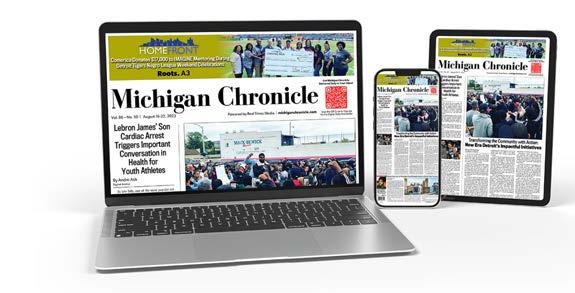

The Wright Performances is a multidisciplinary series of performance works created by critically acclaimed American artists. As a companion to The Wright’s Exhibitions and Public Programs, the series completes the holistic exploration of the profound impact of African American artists and historians on cultures throughout the world.
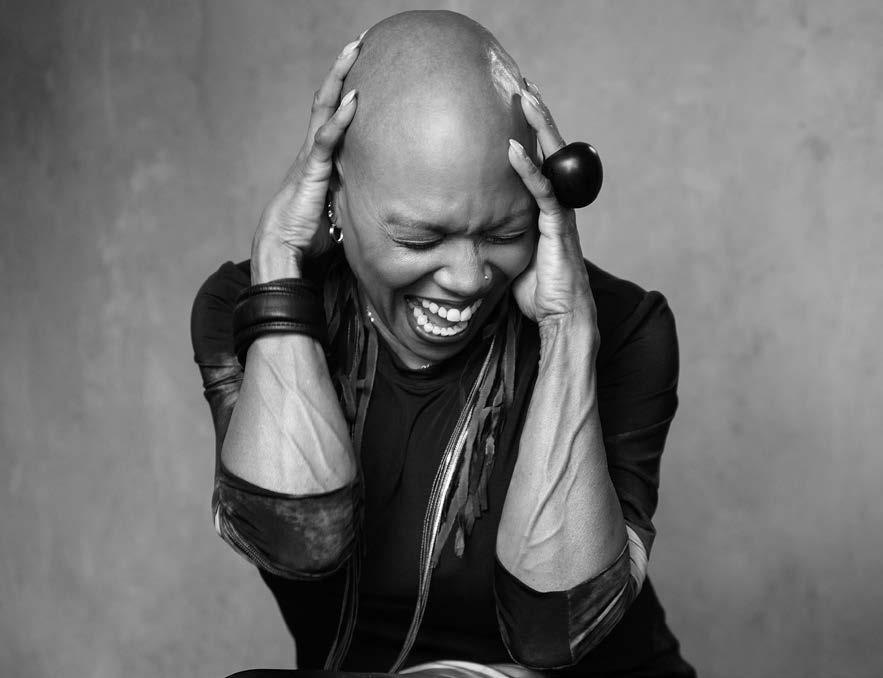
Friday and Saturday, March 27-28, 2026 at 7:30pm

Friday and Saturday, October 24-25, 2025 at 7:30pm

Saturday, December 13, 2025 at 2:30pm or 7:30pm

Friday and Saturday, February 27-28, 2026 at 7:30pm
B1 | October 1-7, 2025
By Jeremy Allen EXECUTIVE EDITOR
With $5 billion being reinvested into Detroit’s ongoing revitalization, the Motor City Contractor Fund (MCCF) is advancing its mission to support and develop local contractors who have often been left out of the city’s evolving economic landscape.
This fall, 50 Detroit-based contractors will join the third cohort of MCCF, a 10-month program aimed at strengthening and scaling the capacity of local construction businesses operating in Detroit. Launched with a $20 million commitment from the Gilbert Family Foundation in partnership with Invest Detroit and other community partners, MCCF is designed to equip participants with access to capital, technical assistance, and meaningful connections that lead to long-term growth.
Beginning in September, the new cohort will receive financial support as well as mentorship, business management tools, and access to opportunities for collaboration and larger-scale projects. The program is a key part of broader efforts to ensure Detroit’s redevelopment includes support for small, local businesses—especially those owned by minorities or historically marginalized groups.
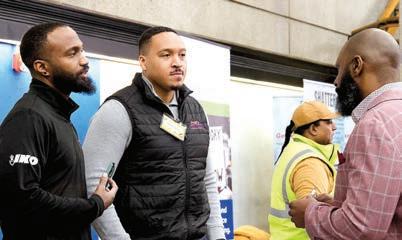
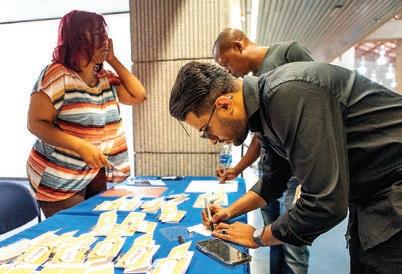
“The Motor City Contractor Fund is designed to help Detroit-based contractors grow stronger, more competitive businesses,” said Kinnus Paul of the Gilbert Family Foundation. “If you are a Detroit-based contractor, MCCF offers more than just loans, it provides the tools, training, and relationships needed to sustain growth. Whether you are looking to improve your back-office systems, qualify for larger projects, or stabilize cash flow, the program can help position your company to compete and thrive in Detroit’s construction market.”
According to Paul, the program has already made a significant impact. Contractors who participated in the first two cohorts reported tangible improvements in their operations and capacity. “Contractors in the first two cohorts have experienced tangible business growth, securing access to affordable capital, building stronger financial management practices, and expanding their capacity to take on larger projects,” he said. “Many have been able to hire more workers, purchase equipment, and strengthen their bonding and insurance, which positions them to compete for public and private contracts they previously could not qualify for. Beyond financing, the program has provided contractors with mentorship, technical assistance, and a peer network that
See MOTOR CITY CONTRACTOR FUND Page B-2
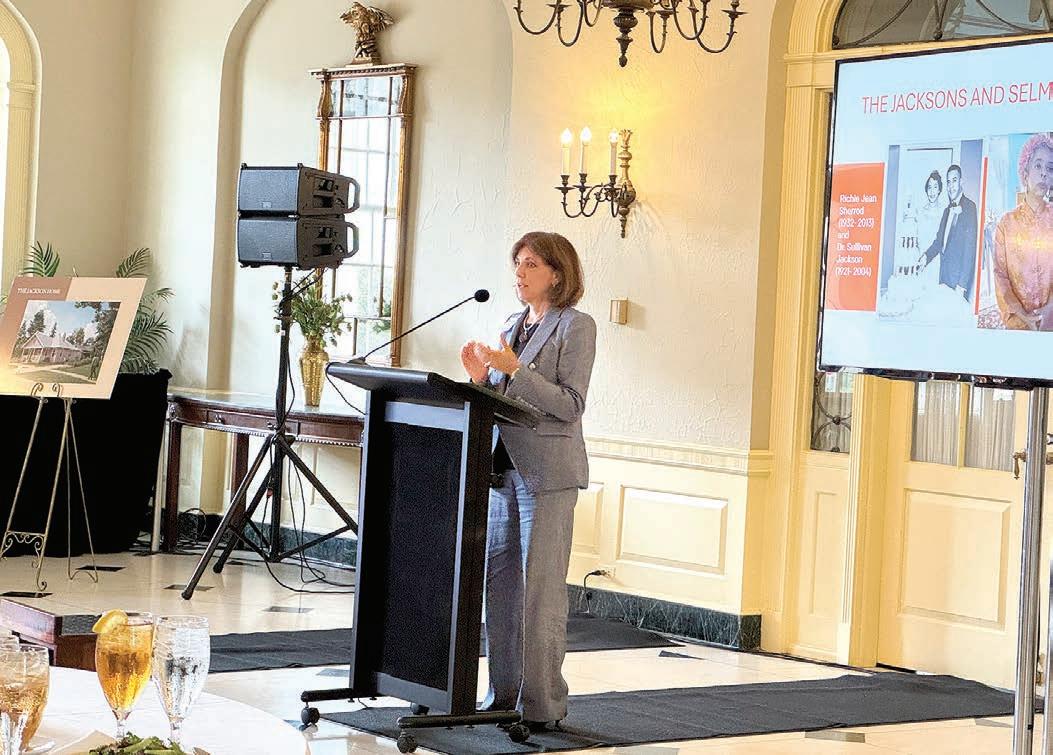
By Samuel Robinson SENIOR REPORTER
Martin Luther King Jr., who turned a middle-class Black family’s home in Selma, Alabama, into a hub for Civil Rights Era planning and strategy, once came to the steps of that home all by himself.
The house was a meeting place for the King’s staff and local leaders. Typically, the reverend would come to the house accompanied by a cluster of young staffers.
But this time, he was alone.
“I am so tired, and your house is the only place I could think of where I can be left alone, get some sleep, and be by myself to think,” King told the late Richie Jean Sherrod Jackson, she writes in her book, “The House by the Side of the Road.”
She lived at the house with her husband, Dr. Sullivan Jackson, a dentist. Jackson, an educator, died in 2013.
The Jackson home is where King organized and strategized the 1965 Selma-to-Montgomery marches. It’s where King watched President Lyndon B. Johnson’s “We shall overcome” speech that preempted the Voting Rights Act of 1965.
And now, the home sits on the Henry Ford Museum’s Greenfield Village in Dearborn.
Leaders at the museum invited media to its Dearborn campus on Wednesday to show off their latest acquisition as part of a presentation on the history of the home and the museum’s current progress.
Moving the house from Alabama to Michigan in 2023 was a $30 million task that required a tremendous amount of logistics, said Henry Ford Museum president and CEO Patricia Mooradian.
The house operated as a museum in Selma, operated by Jackson’s daughter, Joanna Jackson, for about a decade. It is
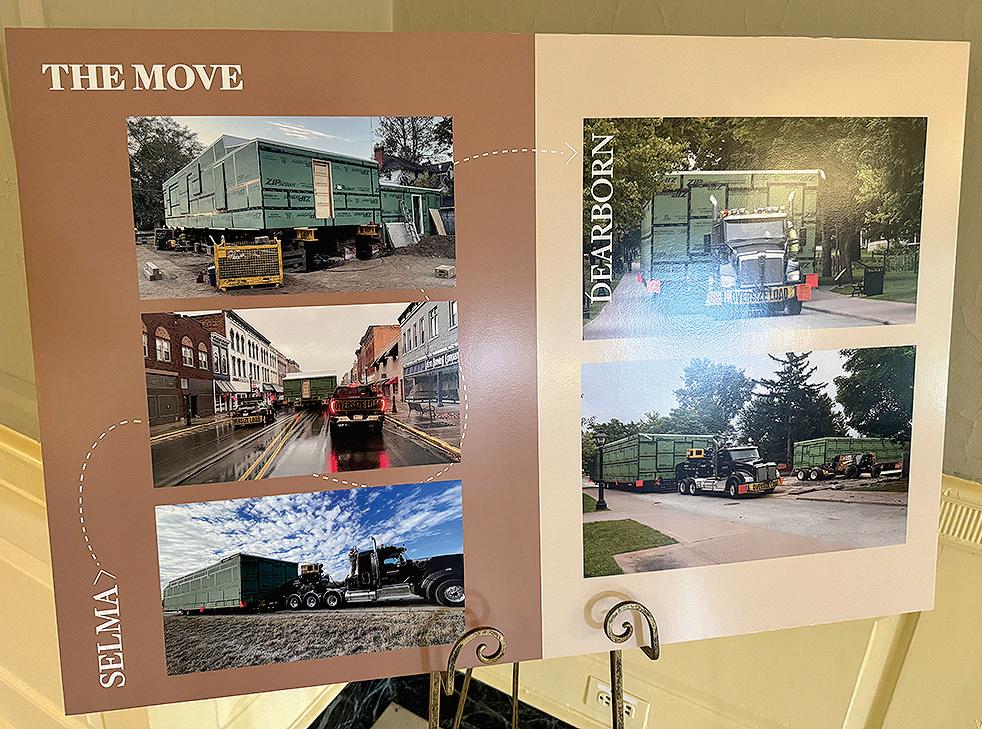
set to open to the public in June 2026, with a three-day block party planned for the opening.
Mooradian said Jackson reached out to the museum several years ago in an attempt for support. After months of talks, it was determined that the only way to get the largest number of people inside the home while keeping it well-maintained was to permanently move it to Michigan.
“Joanna, during this presentation was calling him ‘Uncle Martin.’ When she first said it, I was thinking, ‘Why does she think I know who Uncle Martin is? And then it occurred to me that she’s calling Dr. King, Uncle Martin,” Mooradian said. “We believe we had an obligation to preserve this home so this story can be told to the world. The house represents conflicts we continue to face and civil liberties we continue to fight for. It’s
our job to elevate these stories with good public history — the facts — so that we can inspire the next generation of thinkers and doers.”
King would stay at the house for weeks on end, working with community members and his colleagues at the house. Local leaders like Amelia Boynton, the Rev. Dr. Frederick D. Reese, and the Dallas County Voters League met at the house to strategize how to drum up nationwide support for their efforts to register Black voters.
National groups like the Student Nonviolent Coordinating Committee and later the Southern Christian Leadership Conference helped bring international attention to Selma and the effort to register Black voters. Hundreds of people came
See THE JACKSON HOME Page B-2
By Ebony JJ Curry
SENIOR REPORTER
So many times, Detroiters have faced conflict when it comes to entrepreneurship. From discriminatory lending practices that shut out Black-owned businesses to fragmented support networks that left good ideas stranded, the struggle to launch and sustain has been constant. Even now, when Detroit is often celebrated as a hub for innovation, many founders say the path still feels like a maze with no clear map.
A new platform called Round Here, launched in August, is trying to rewrite that story. Built in Detroit and designed for Michigan’s entrepreneurial community, the platform consolidates the resources founders need into a single space. For Matthew Burnett, the Detroit native behind the project, the mission is personal.
“Starting a business is hard. Getting the right support shouldn’t be,” Burnett said. “We built Round Here to turn every coworking space, service provider, and expert into an open door—so no Michigan founder feels like they’re building alone.”
Burnett is no stranger to build-
ing networks. His previous venture, Maker’s Row, connected more than 300,000 businesses with manufacturers across the United States and drew investment from major players like Reddit’s Alexis Ohanian. With Round Here, he is applying that same model of connectivity to Michigan’s business ecosystem, where the challenges are less about ambition and more about access.
Michigan is home to over 902,000 small and midsize businesses, according to state data. Yet many of them struggle to survive beyond the early years. Founders cite the same issues repeatedly: lack of access to grants or investors, limited exposure to peers and mentors, and difficulty finding trusted legal or financial services. National reports have shown that Black entrepreneurs in particular are less likely to receive traditional bank loans or venture capital, creating an uneven playing field.
Round Here is designed to counter those gaps. The platform includes live workshops on everything from fundraising to marketing, searchable networks of accelerators and investors, and a statewide job board. Users can also connect with vetted freelanc-
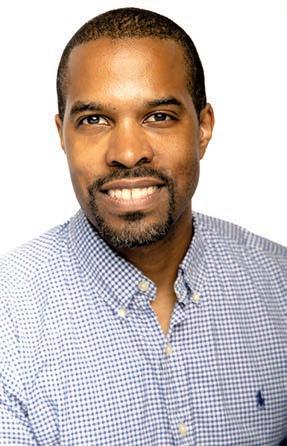
Matthew Burnett
ers and join a peer-to-peer community for referrals and advice. An AI-powered engine personalizes recommendations, helping founders identify what resources make sense based on where they are in their growth cycle.
Burnett says the platform is equally a bet on coworking spaces, which have multiplied across Detroit over the last decade but often lack sustainable programming. Round Here allows those spaces
to host and livestream classes, archive content, and track results through built-in analytics. For operators, that means more tenants, new revenue through sponsorships, and stronger visibility for local coaches and experts.
“We’re helping coworking operators go from just renting desks to leading the entrepreneurial conversation,” Burnett said.
TechTown and Newlab, two of Detroit’s most prominent innovation hubs, are among the platform’s early partners. Their involvement is a sign that Round Here isn’t launching in isolation but tapping into existing anchors in the city’s entrepreneurial landscape.
The timing matters. Detroit’s business community has been reshaped in the decade since the city’s bankruptcy, with philanthropy, universities, and private capital all playing larger roles. Yet many entrepreneurs—especially in neighborhoods outside downtown and Midtown—say they still feel left behind. Round Here’s model, if it works, could bridge that divide by making resources as accessible to a founder in northwest Detroit as one pitching investors in Corktown.
The ambition goes beyond Michigan. Burnett and his team envision scaling the platform across the Midwest and eventually into a national network serving the country’s 33 million small businesses. The idea is to build a system where place is no longer a limitation, and where every founder, regardless of ZIP code, can find the support they need.
For Detroit, the launch adds another chapter to its long tradition of entrepreneurship. From the Black-owned businesses that anchored Paradise Valley in the early 20th century to the auto suppliers and corner stores that sustained neighborhoods, the city has always been shaped by those willing to take risks. But the conditions for success have often been unequal. Round Here enters that history with a promise of democratization—taking the scattered infrastructure of support and putting it within reach of anyone willing to log in.
Burnett believes that’s the future of entrepreneurship in Detroit: community-driven, tech-enabled, and rooted in the idea that no one should have to build alone. Ebony JJ Curry can be reached at ecurry@michronicle.com
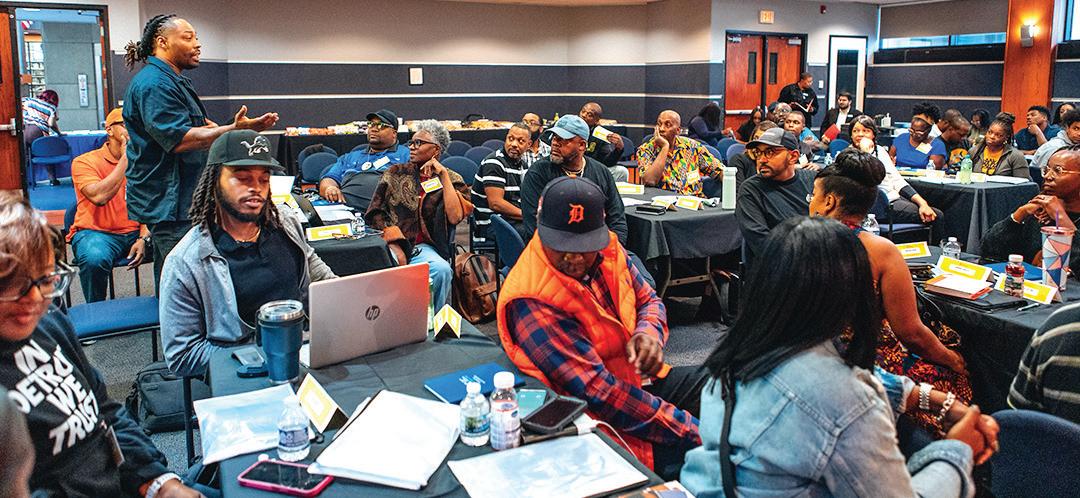
continues to support their success long after the cohort ends.”
The MCCF model is structured to not only support current business operations but also create a ripple effect throughout Detroit’s economy by increasing job opportunities and local ownership of redevelopment efforts. For many participants, the program represents a rare opportunity to scale their businesses with targeted and culturally relevant support.
Maurice Wiggins, owner of Wiggins Roofing, Inc., completed the program earlier this year and praised its comprehensive approach. “What they have put together is one of the best programs I have ever been a part of, and I have been a part of many of the programs offered to contractors, so I know,” Wiggins said. “This program meets you where
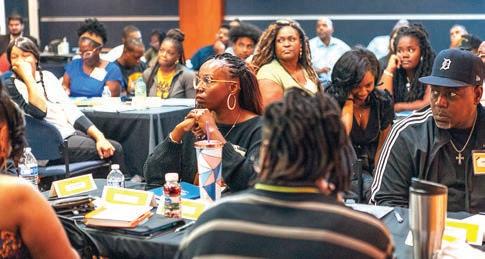
you are and fills the gaps.”
While the MCCF has focused primarily on established contractors in the Detroit area, the initiative is expanding to meet the needs of emerging entrepreneurs. Its newly launched Ignite Program is designed specifically for those at the beginning of their contracting careers, providing a pathway into the industry with foundational support.
To continue fostering a vibrant and inclusive contractor community, MCCF will host an informational session at the Southfield headquarters of Barton
through the home, including Nobel Peace Prize winners and international dignitaries.
State money is going toward the home’s restoration. The Michigan Strategic Fund approved a $9 million bond during an Aug. 26 board meeting for the restoration of the home. The bond will pay for installing the home into a permanent position as well as furnishing a new 1,500-square-foot annex attached to the home, according to the Michigan Economic Development Corporation.
“The Jackson Home serves as a unique time capsule documenting one of the most

Malow, one of its key partners, on Tuesday, Oct. 14, from 5 to 7 p.m. The event is open to interested contractors, but registration is required.
As MCCF welcomes its third cohort, its impact continues to grow—redefining what equitable development can look like in Detroit by investing in the people and businesses rooted in the city.
More information, including details about how to apply for future cohorts or the Ignite Program, can be found at www.motorcitycontractorfund.org.
momentous movements in U.S. history, the Selma-to-Montgomery Civil Rights marches,” the MEDC wrote in a release. “Through thoughtfully curated exhibits and immersive storytelling, the Jackson Home will provide visitors with enriching experiences that highlight the powerful legacy of the civil rights movement.”
The Henry Ford is working on programming for touring guests through the historic home, which was placed on Maple Lane near the Logan County Courthouse in Greenfield Village, where Abraham Lincoln practiced law.
Greenfield Village, an open-air museum created by Henry Ford, is home to one of the most significant collections documenting the American experience anywhere in the country.



By Layla McMurtrie
At a time when many Southeast Michigan families are turning to food banks for help, federal support is beginning to dwindle.
Earlier this year, Gleaners Community Food Bank, founded in 1979, learned it would be receiving 1 million fewer pounds of food than expected. The shortfall stems from cuts to USDA programs that had bolstered emergency food providers by purchasing surplus food from American farmers.
Federal cuts, local consequences
The financial impact is steep. Kristin Sokul, senior director of advancement communications for Gleaners, says the organization is facing a gap of around $850,000. If unaddressed, the funding loss could translate to food for 25,000 fewer households over the course of a year.
Nationally, the scope of the change is enormous. “More recently, the USDA cut these programs—over a billion dollars of funding that would have otherwise gone into communities,” Marlene Schwartz, director of the Rudd Center for Food Policy and Health, said in an interview with SciLine. “It makes it harder for places like schools and food banks to purchase food locally.”
The loss is tied in part to reductions in the Emergency Food Assistance Program (TEFAP), a USDA pipeline that distributes surplus U.S.-grown food to food banks across the country. Sokul says much of the eliminated TEFAP funding had prioritized purchases from local and regional growers—support that previously benefited both farmers and families facing hunger. Two models, same mission
Gleaners, which operates a large distribution hub and partners with hundreds of smaller pantries across five counties, uses a centralized food bank model to collect,
store, and distribute groceries to those in need.
It is far from the only food provider feeling the pinch.
In Oak Park, Forgotten Harvest takes a different approach. Originally founded as a food rescue organization, it focuses on reclaiming surplus food from grocery stores, restaurants, and farms. Today, it operates as a hybrid distributor with warehouse storage and its own fleet of trucks, though its food rescue mission remains core to its identity.
“This year alone, we’ve absorbed a cut of about $740,000, which represents roughly 400,000 pounds of food,” CEO Adrian Lewis says. “This could be seen as a major crisis for our area.”
While Forgotten Harvest and Gleaners rely on a mix of funding streams, including state programs, private donations, and food industry partners, Lewis says the sudden federal pullback puts pressure on emergency food providers to work much harder to meet the same goals.
State Farm support offers a lifeline.
One source of relief still in place is the Michigan Agricultural Surplus System, or MASS, a state program that helps cover the cost of transporting excess crops.
“That is separate. That’s funding from the state,” Lewis says. “And again, thank God for that, because that’s definitely a huge part of what we’re able to do.”
Sokul adds that the effects of federal cuts are already showing up in the field. Though Gleaners continues to meet need, the organization has dipped into its reserves to keep food flowing to smaller agencies that might otherwise go without.
“When resources are down, some of our partners, who may not have as large of an operation or may not have the flexibility to fill those gaps, can’t stretch their budgets,” Sokul says. “We used some of our own reserves to help those partners purchase food
so that their guests can have balanced nutrition.”
Nutrition goals at risk
Lean proteins and dairy, two of the more expensive, high-demand food categories, have been hardest to source under tighter budgets. Sokul says Gleaners has worked to keep distribution levels stable, but future cuts could change the mix or quantity of items families receive.
“We may have to shift what is offered to a lower cost item,” she says. “Instead of the average of 40 or 45 pounds that you get in a distribution, it may be five pounds lighter.”
These shifts also come at a time when food banks have been working to raise the quality, not just the quantity, of food they provide.
“There’s been a very concerted national effort among food banks across the country to try to improve the nutritional quality of the food that they provide,” Schwartz says. “The families that rely on the charitable food system often have a higher risk of diet-related illness, like high blood pressure or type 2 diabetes.”
Broader economic impact
The impact extends beyond pantry shelves. Receiving food assistance isn’t just about nutrition; it also frees up household income for other essential living expenses like rent, utilities, or gasoline to get to work and school.
“These are more than just, ‘Do you have enough lettuce in your salad?’” Sokul says. The economic benefits of food assistance, she adds, translate beyond the four walls of
a household.
Lewis says Forgotten Harvest is preparing for further turbulence ahead, especially with uncertainty looming around the long-delayed Farm Bill. The massive federal legislation, typically renewed every five years, controls funding for programs like TEFAP, SNAP, and even Medicaid.
“That’s going to really overwhelm us in a sense if we’re not prepared for it with the funding as well as the food,” he says. “But, we’re going to stand steadfast on our goal to be able to deliver what we have free of charge.”
Call to action
To brace for what’s ahead, both Gleaners and Forgotten Harvest are calling on corporate partners, private donors, and community members to help bridge the gap. Lewis says his organization is ramping up fundraising efforts to keep its services steady.
Despite the challenges, both organizations are doubling down on collaboration. Lewis says that Forgotten Harvest is in regular conversations with other agencies to share information and resources.
“There are no secrets in this space,” he says. “We’re going to figure it out. We can’t get through this without stronger collaboration.”
For community members looking to help, every donation of food, money, or time makes a difference.
“Hunger can happen at any time to anyone,” Lewis says. “This is an opportunity to keep giving our community a hand up during these tough times.”

By Ebony JJ Curry SENIOR REPORTER
Michigan is moving to rewrite how it teaches young people about health for the first time in almost two decades. The state’s Department of Education has released draft updates to its K-12 health education guidelines, a shift that will affect classrooms from Detroit to the Upper Peninsula if approved later this fall.
The last time Michigan set these standards was 2007. Back then, the opioid crisis had not yet reshaped families, smartphones weren’t in every student’s hand, and mental health had not taken over national headlines. Today, those issues sit at the heart of what schools are asked to navigate. That’s why state officials say the revisions are overdue.
“It is important to update our health education standards to better reflect current trends, terminology, and best practices, and to be more culturally responsive, especially around the topics of nutrition, safety, and social emotional and mental health,” said State Superintendent Dr. Michael F. Rice. “These standards support Goal 3 of Michigan’s Top 10 Strategic Education Plan, to improve the health, safety and wellness of all learners.”
The guidelines provide a framework for local school districts, though each district ultimately chooses whether and how to use them. They cover personal wellness, substance use, mental and emotional health, and sexual health. The updates shift the way the information is structured. Instead of setting expectations grade by grade, the new draft uses grade ranges, giving educators flexibility to meet students where they are developmentally.
Aimee Alaniz, who directs the department’s office of health and safety, told the State Board of Education that the focus has moved from “standards” to “practices.” She argued that the word “standard” suggests a fixed endpoint, while “practices” encourages students to keep building their skills. The language mirrors national health education updates approved last year and borrows heavily from Massachusetts’ most recent model.
That might sound technical, but the changes speak to bigger questions about what young people should learn in the classroom and who gets to decide. The state can adopt a framework, but parents, school boards, and local leaders shape how it shows up day to day.
Sexual health remains one of the most contested areas. Michigan’s draft leaves districts in control, requiring local boards to work with families and community members on how to approach the subject. But the revisions also carve out a separate space for “healthy relationships.” It signals that lessons on respect, communication, and consent belong in the curriculum,

whether or not a district chooses to teach sexual health.
The update comes at a time when the pressures facing Michigan students look different from those they faced when the last standards were adopted. Youth mental health has emerged as a crisis across the country. The CDC has documented record levels of anxiety and depression among teens, especially girls and LGBTQ youth. Vaping has spread through middle and high schools. Opioid misuse continues to claim lives across Michigan, cutting into families in rural and urban communities alike.
Parental rights shape sexual health instruction if a district chooses to offer it.
Parents are to be notified of sex education instruction prior to lessons being taught. Parents have the right to review sex education curricula prior to instruction. Parents can exclude their child without penalty from some or all sex education instruction.
Under state law, districts decide what to include in sexual health lessons with input from their Sex Education Advisory Boards. Michigan requires those boards to be made up of at least 50 percent parents, making the state’s rules among the most comprehensive in the country. Advisory boards review student data and curricula, then provide recommendations to their district’s board of education for approval.
That process has played out in Detroit as well. In Detroit Public Schools Community District, Sex Education Advisory Boards have historically included not only parents but also community health advocates and representatives from local organizations working in HIV prevention and teen well-
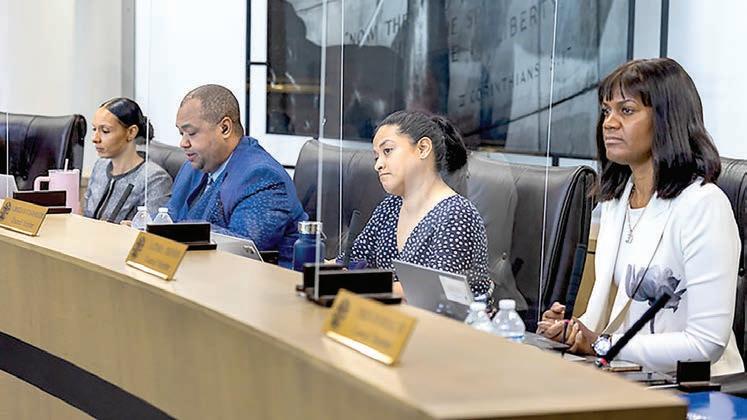
By Ebony JJ Curry SENIOR REPORTER
Detroit City Council members this week sat down with 10 finalists competing for one of Detroit’s most influential yet often under-the-radar posts: the city ombudsman. They are expected to vote on the appointment as early as next week.
The ombudsman is the person Detroiters call when city services fail, when complaints get lost in bureaucracy, or when residents feel their voices don’t reach the top. The office serves as a watchdog and mediator, bridging citizens and government, with authority to investigate complaints across city departments. The role comes with a decade-long term and a salary of $195,000, reflecting the weight of the responsibility. The current ombudsman, Bruce Simpson, reaches the end of his appointment on October 5. City Council narrowed the pool of applicants and brought forward a mix of names that reflect both government insiders and community-rooted leaders. Among them is Gail Barnard, the current deputy ombudsman, who already has experience navigating citizen grievances within the office. Anthony Zander, who leads Detroit’s Civil Rights, Inclusion and Opportunity Department, is also in the running, bringing a background in equity enforcement. Tiffany Tilley, a member of the Michigan State Board of Education, has positioned herself as an advocate for families and young people, while District 2 manager Kim Tandy would arrive with experience directly tied to Mayor Mike Duggan’s administration.
Several candidates come from broader civic and political networks. Dennis Perkins, a contract advisor with the NFL Players Association and former staffer for Council Member Latisha Johnson, brings both national and local exposure. Darius “Cope
Hope” Huff, a U.S. Department of Labor project manager, ties federal workplace perspectives to Detroit. Former state lawmaker and current Detroit school board member Sherry Gay-Dagnogo is seeking to extend her record of public service. Reggie Davis, who once served on the Wayne County Commission and now works with Council Member Mary Waters, offers a mix of county and city hall experience. Rounding out the list are Anthony Reddit and Jessica Gates, both of whom bring their own visions for how the office could work.
Gay-Dagnogo, who has long been active in Detroit politics and education, spoke openly after her interview. “I was honored to be selected as one of 10 candidates to share my vision for the appointment to be your next city of Detroit ombudsman before the members of the Detroit City Council,” she said. “This 10-year appointment begins October 2025. I remain prayerful as I am eager to serve the city I love.”
The choice carries weight beyond filling a vacancy. A 10-year appointment means whoever is selected will shape how complaints about city services, housing conditions, police interactions, and countless other issues are addressed well into the next decade. With Detroit continuing to navigate questions about equitable growth and government accountability, the ombudsman’s office stands at the intersection of resident trust and city performance.
Council’s decision, expected in early October, will determine whether Detroit doubles down on internal expertise, leans into political experience, or charts a new path through a fresh voice. What’s certain is that residents will be watching closely—because how the city listens and responds to its people will depend on the leadership of the office chosen in the coming days. Ebony JJ Curry can be reached at ecurry@ michronicle.com
ness. Their recommendations carry weight in shaping how the district balances parental concerns with public health priorities in a city where young people often face higher risks tied to poverty, limited healthcare access, and exposure to trauma.
Dr. Diane Golzynski, deputy superintendent for business, health, and library services at the Michigan Department of Education, said the broader purpose of the update is to better equip students with skills that last beyond the classroom. “The goal of health education is to develop young people who are health-literate and engage in practices that lead to an overall healthy lifestyle throughout their lives,” she said. “This updated version of Michigan’s standards is more robust and adds details and attention to the critical skills of comprehensive health education and makes links among students’ well-being, school performance and family involvement.”
In that context, the health classroom becomes one of the few spaces where students might get consistent, evidence-based guidance. Advocates say that makes it more urgent for Michigan to update its playbook, though how districts handle the responsibility will vary widely. Some may embrace the framework. Others may push back, especially around sexual health.
That tension is not new. Debates over what should be taught have played out in school board meetings for decades. But this time, the stakes feel sharper because the issues themselves—mental wellness, digital safety, substance misuse—are more visible in everyday life.
For educators, the update also raises questions about resources. Even the best
framework only works if schools have the staff, training, and time to teach it. Health education is often crowded out by other academic requirements, and in some districts, it is assigned to teachers who juggle multiple subjects. Without funding and support, the new practices may be difficult to sustain.
What Michigan is signaling, though, is a shift in philosophy. Health education is no longer framed as a box to be checked once in middle or high school. It is being presented as a continuous skill set that students refine throughout their education. That mirrors how public health experts talk about resilience—not as a single milestone but as something built over time.
The draft guidelines are open for public comment until October 10 on the Department of Education’s website. Parents, educators, and community members are invited to weigh in before the State Board votes on final approval. That public process ensures the changes won’t be made quietly. It also means that familiar debates over what belongs in Michigan’s classrooms are likely to surface again in the weeks ahead.
At its core, the revision is an acknowledgment that the health challenges facing young people in 2025 look nothing like those of 2007. Whether local schools adopt the changes fully, selectively, or not at all, the update reflects a recognition that preparing children for life requires more than math and reading. It requires giving them the tools to manage their bodies, their minds, and their relationships in a world that has only grown more complicated.
Ebony JJ Curry can be reached at ecurry@ michronicle.com

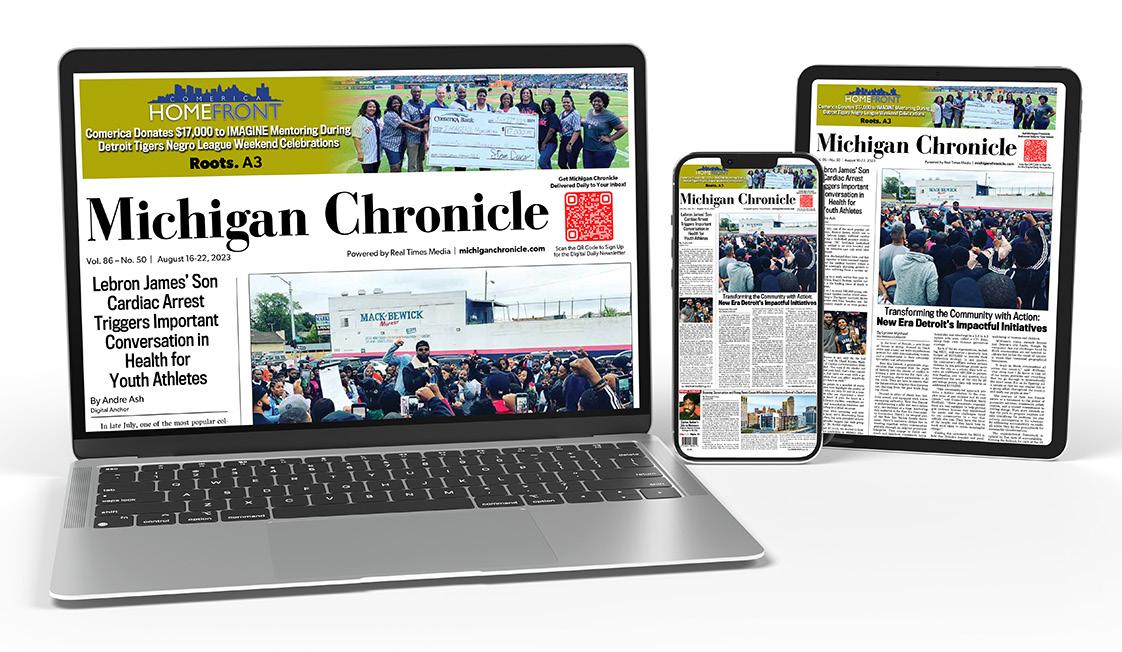

The Suburban Mobility Authority for Regional Transportation (SMART) is soliciting RFP Control No. 26-4341 for Third Party FMLA Administrator.
RFP forms will be available beginning September 24, 2025, from http://www.mitn.info. Proposals are due by 3:00 PM ET, October 16, 2025.
2 cols x 1.5 inches FAMILY FEATURES
The Suburban Mobility Authority for Regional Transportation (SMART) is soliciting RFP Control No. 26-4341 for Third Party FMLA Administrator Services. RFP forms will be available beginning October 1, 2025, from http://www.mitn.info. Proposals are due by 3:00 PM ET, October 29, 2025.

House fires can be devastating, but taking proactive steps can significantly reduce the risk.
Learn how to safeguard your home and loved ones with these fire prevention tips in honor of Fire Prevention Month.
Install and Maintain Smoke Alarms
Smoke alarms are your first line of defense in case of a fire. They provide early warning, giving you and your family time to evacuate.
Ensure you have smoke alarms installed on every level of your home, including inside bedrooms and outside sleeping areas. Test your smoke alarms monthly to make sure they’re working properly and replace the batteries at least once a year. If your smoke alarms are more than 10 years old, consider replacing them to ensure optimal performance.
Create an Emergency Evacuation Plan
Sit down with your family and create a detailed plan that includes an exit strategy (or two) from every room in your home. Make sure everyone knows where to meet out-
side and practice your evacuation plan regularly.
Prevent Kitchen Fires
Cooking is the leading cause of house fires in the United States, according to the National Fire Protection Association (NFPA) with fire departments responding to more than 170,000 home cooking fires annually. Always stay in the kitchen while frying, grilling or broiling, and keep flammable items such as potholders, paper towels and wooden utensils away from the cooking area. Additionally, clean your stove and oven regularly to prevent grease buildup, which can catch fire, and keep a fire extinguisher within easy reach.
Keep Flammable Materials at Bay
Store gasoline, propane and other flammable liquids in approved containers and keep them in a well-ventilated area, away from heat sources and out of reach of children. Ensure your home is free of excessive clutter, especially in the basement, attic and garage, which can fuel a fire and make it harder to escape.
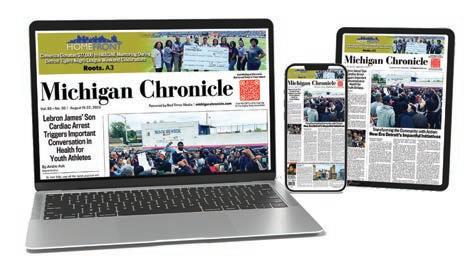


Maintain Electrical Safety
To help prevent electrical fires – electrical distribution or lighting equipment ranks third among causes for home fires, according to the NFPA – regularly inspect your home’s electrical system. Look for frayed wires, overloaded outlets and malfunctioning ap-
pliances. Avoid using extension cords as a permanent solution and never run them under rugs or furniture. Additionally, make sure to use light bulbs with the correct wattage for your fixtures. Find more tips to help keep your home safe at eLivingtoday.com.
FAMILY FEATURES
Nowadays, you can buy just about anything online and have it delivered and installed with just a few clicks. This includes major home appliances such as refrigerators, washing machines, dishwashers, furnaces, heat pumps and water heaters.
However, making a large purchase without inspecting the product or planning for installation comes with its own challenges. To ensure a smooth shopping experience, consider these tips for buying major home appliances online.
Do Your Homework
Set a budget and determine what features are necessities and which are nice to have. When you start searching, you’ll be able to compare product features and reviews. Look for customer feedback, especially regarding durability, performance and features.
For large and installed appliances like water heaters and heating, ventilation and air conditioning (HVAC) units, research system requirements including size, capacity and system type (like gas or electric) and compatibility with your current home infrastructure like ductwork. Another consideration is if your state or municipality has local code compliances you must meet like emissions or energy-efficiency standards. This can be time-consuming and difficult for some homeowners.
When shopping online, look for retailers that have partnerships with professional and licensed contractors to help determine the appropriate equipment for your home, make the installation process easy and help you tap into local utility rebates and tax credits.
Consider the Seller
On some online marketplaces, products may be listed by third-party sellers who are not affiliated with the original manufacturer, meaning the product may not be covered by the manufacturer’s warranty. Third-party sellers may not have relationships with local dealers or contractors, and most contractors won’t install or repair products not purchased directly from a manufacturer.
To help you purchase with confidence, Walmart and Bryant Heating & Cooling created a unique partnership to simplify the HVAC buying journey. Customers who inquire at Walmart.com are paired with a highly qualified and reputable dealer to help homeowners assess their requirements, offer energy-efficient equipment solutions and provide installation by trained, certified professionals.
courtesy of Shutterstock

Document Everything and Keep a Paper Trail Documentation of higher priced items, especially those with installation next steps and extended warranties, can be helpful if you run into issues. Some of the documents you should keep (in paper and digital versions, if possible) include a final invoice, permits (if applicable), warranty terms and information, delivery and installation scope of work and timelines. Take photos before and after installation. Buying large home appliances and installed appliances online can save time and money, provided you approach it thoughtfully. This is part of a broader trend toward digital convenience in home services that makes online tools, virtual consultations and price transparency more accessible. With a little research, comparison and attention to detail, you can find the right appliances to fit your home, lifestyle and budget – without ever stepping into a store.
To find more heating and cooling solutions, visit Walmart.com/Bryant.
It’s easy to get excited about a product and not think what happens if it malfunctions, so it’s important to look for a manufacturer’s warranty and if extended protection plans are available. When you find warranty information, read the fine print. Most manufacturers require the equipment to be registered after it’s installed to realize the full warranty benefits.

Many online retailers offer financing for big purchases, including zero-interest promotions or “buy now, pay later” options. These monthly payment options allow you to fit large purchases into your budget rather than dipping into savings. Watch for hidden fees or high interest rates after promotional periods end. For installed systems, check if you can bundle financing with installation and extended warranties for convenience. Some appliance manufacturers offer discounts on products if purchased through specific retailers. For instance, if you purchase a Bryant Heating & Cooling system through Walmart, you will receive an instant savings on the cost of a new HVAC unit
and qualified customers can take advantage of exclusive financing offers.
Products are easy to purchase online, but poor planning on delivery and installation can turn the process into a hassle. For larger and installed appliances, make sure delivery includes unboxing, setup and removal of old units, if needed.
Documentation of higher priced items, especially those with installation next steps and extended warranties, can be helpful if you run into issues. Some of the documents you should keep (in paper and digital versions, if possible) include a final invoice, permits (if applicable), warranty terms and information, delivery and installation scope of work and timelines. Take photos before and after installation.
Buying large home appliances and installed appliances online can save time and money, provided you approach it thoughtfully. This is part of a broader trend toward digital convenience in home services that makes online tools, virtual consultations and price transparency more accessible. With a little research, comparison and attention to detail, you can find the right appliances to fit your home, lifestyle and budget – without ever stepping into a store.
To find more heating and cooling solutions, visit Walmart.com/Bryant.

